Ladakh: Leh - Indus - Zanskar
The starter of a sumptuous course of Ladakh traveling.
Indus River Valley
The river kept playing hide-and-seek with us as we drove along the highway.
So finally after more than two years of COVID era, I was able to step outside my home countries for another tempting international journey. I chose India as it’s among the first countries opened for unrestricted flights, so thinking that it would be an easy-peasy trip, but turned out to be an arduously challenging ride at the end.
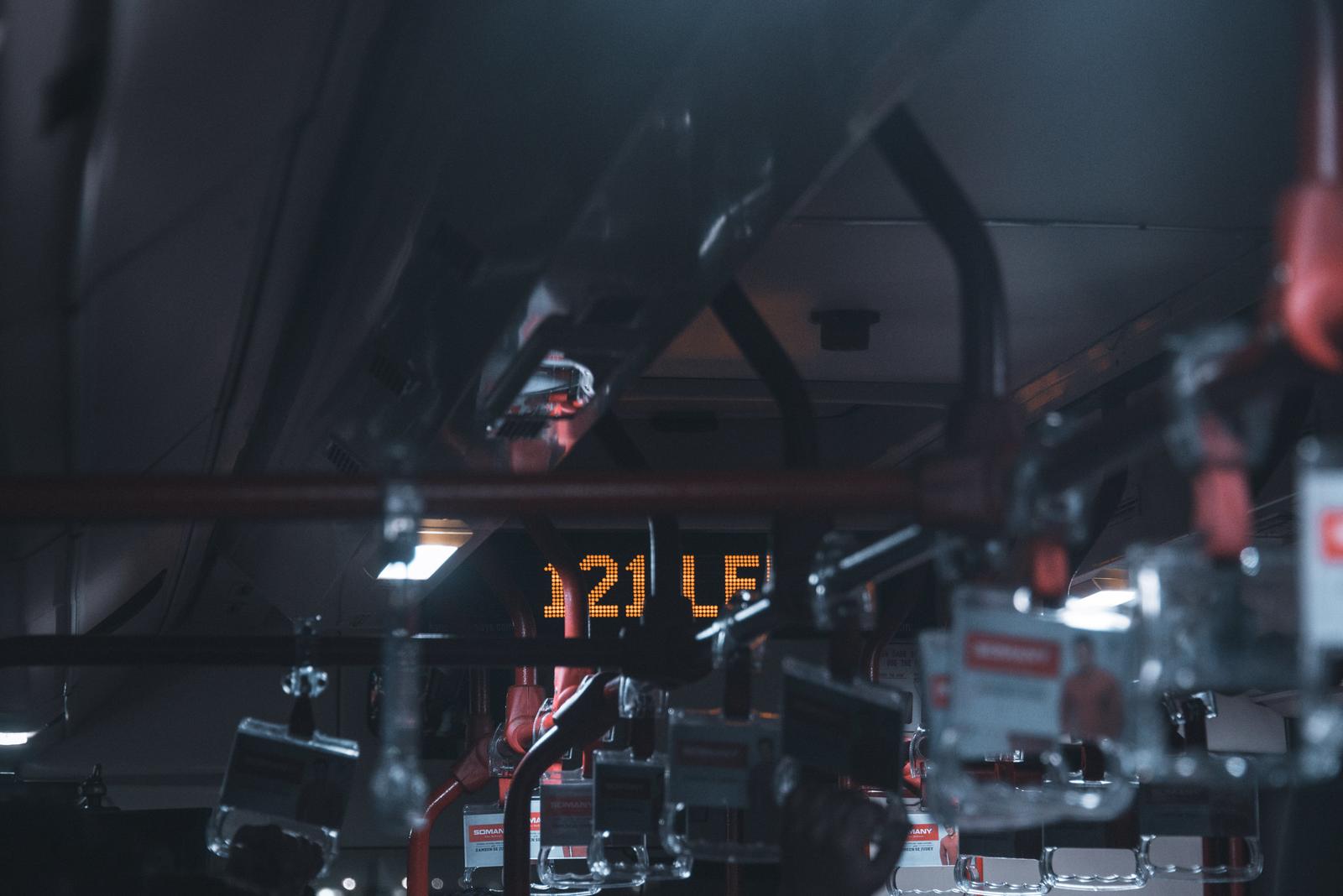
It had been exactly one year after the disastrous Delta wave swept through the country, and then I was here, inside a pretty shabby Delhi Airport shuttle bus in the midst of night before dawn. Despite the timing, the scorching wind of Indian summer was still blowing in the air, and it’s only when reached the cooled domestic terminal waiting room, I could start putting my mind into the actual trip, trying to revive my solo-traveling skill almost forgotten after years of pandemic.
Arriving in Leh
3,500m above the sea level, Leh - the capital of Ladakh Union Territory, the historical capital of the Kingdom of Ladakh, and the starting point of the trip - differentiated itself with its majestic Himalayan snow-capped mountains.
It took me a whole morning readjusting my body to fight with altitude shock. That’s a surreal feeling for the first time facing such situation, gasping for breath while trying to stabilize on my own’s feet climbing the stairs. A warm cup of Indian milk tea from the hotel had helped, though.
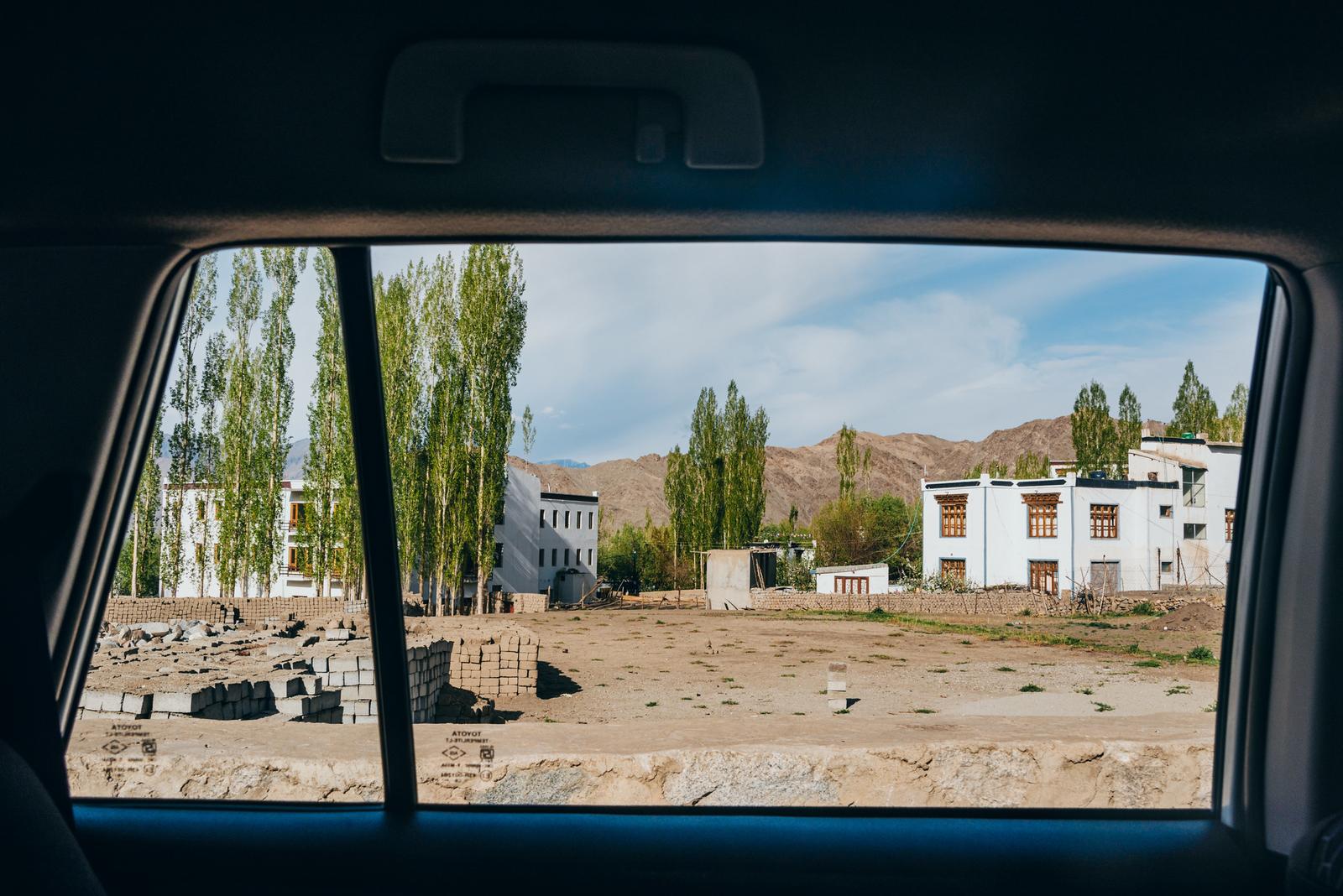

The first lunch was a bowl of Tibetan noodles, it’s recharging time before jumping on the ride with my driver. On the same day, the travel agency would do some paperwork to get the Inner Line Permit for your next days in Nubra or Pangong.
A Journey to Indus - Zanskar Sangam (Confluence)
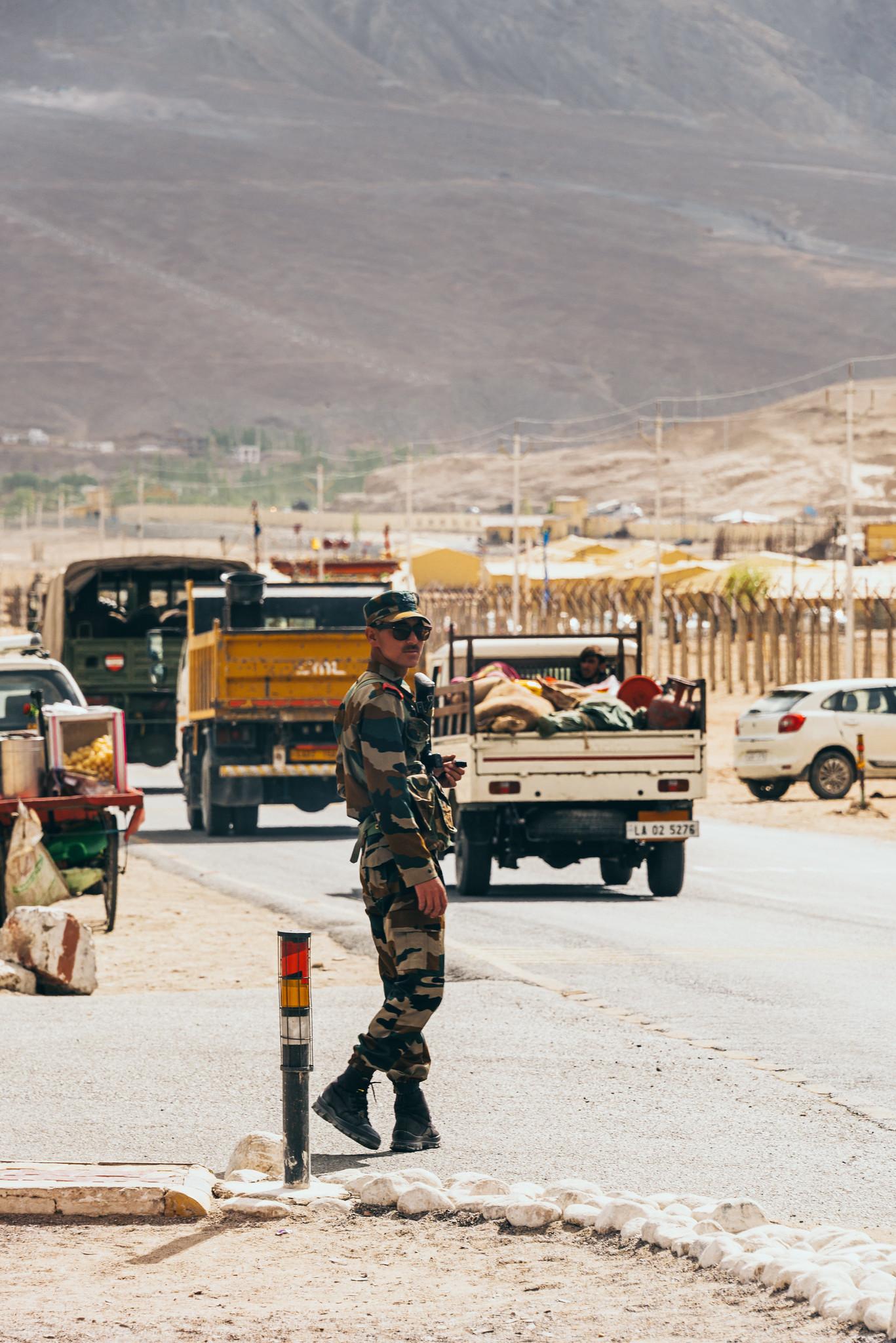
Now the journey really started. On the first day, the driver would guide me to Indus - Zanskar Sangam, via Srinagar - Ladakh Highway, to the south of Leh beginning from Kushok Bakula Rimpochee Airport. Along the way, you can pass by Leh Hall of Fame, as well as Spituk Monastery - the first sighted among an abundance of monasteries perched on cliffs.
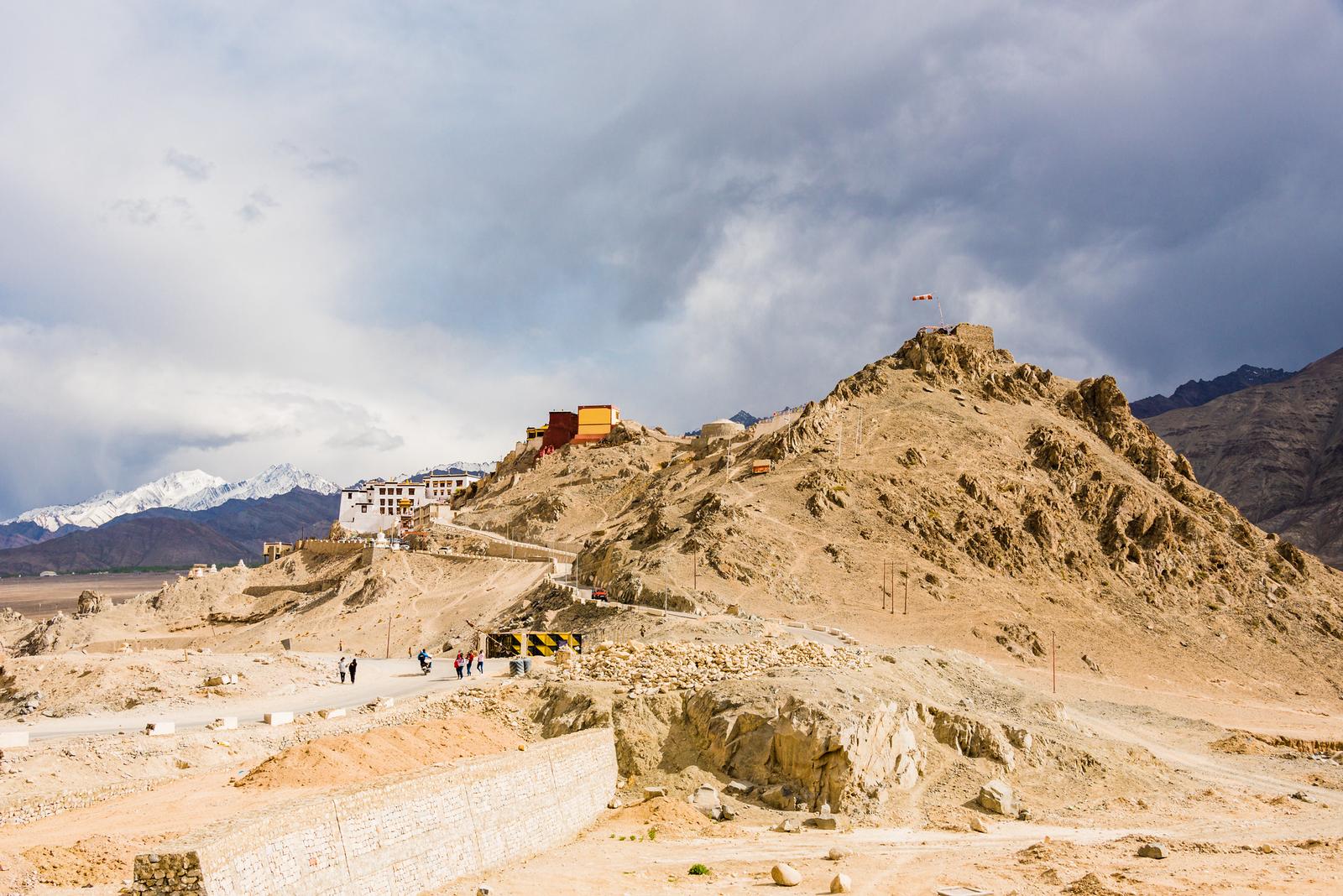
As we moved further westwards, lush trees and grassland in spring was unveiled along Indus River Valley, surrounded by dry, rocky terrain and extreme peaks. A peculiar landscape that should not be missed.
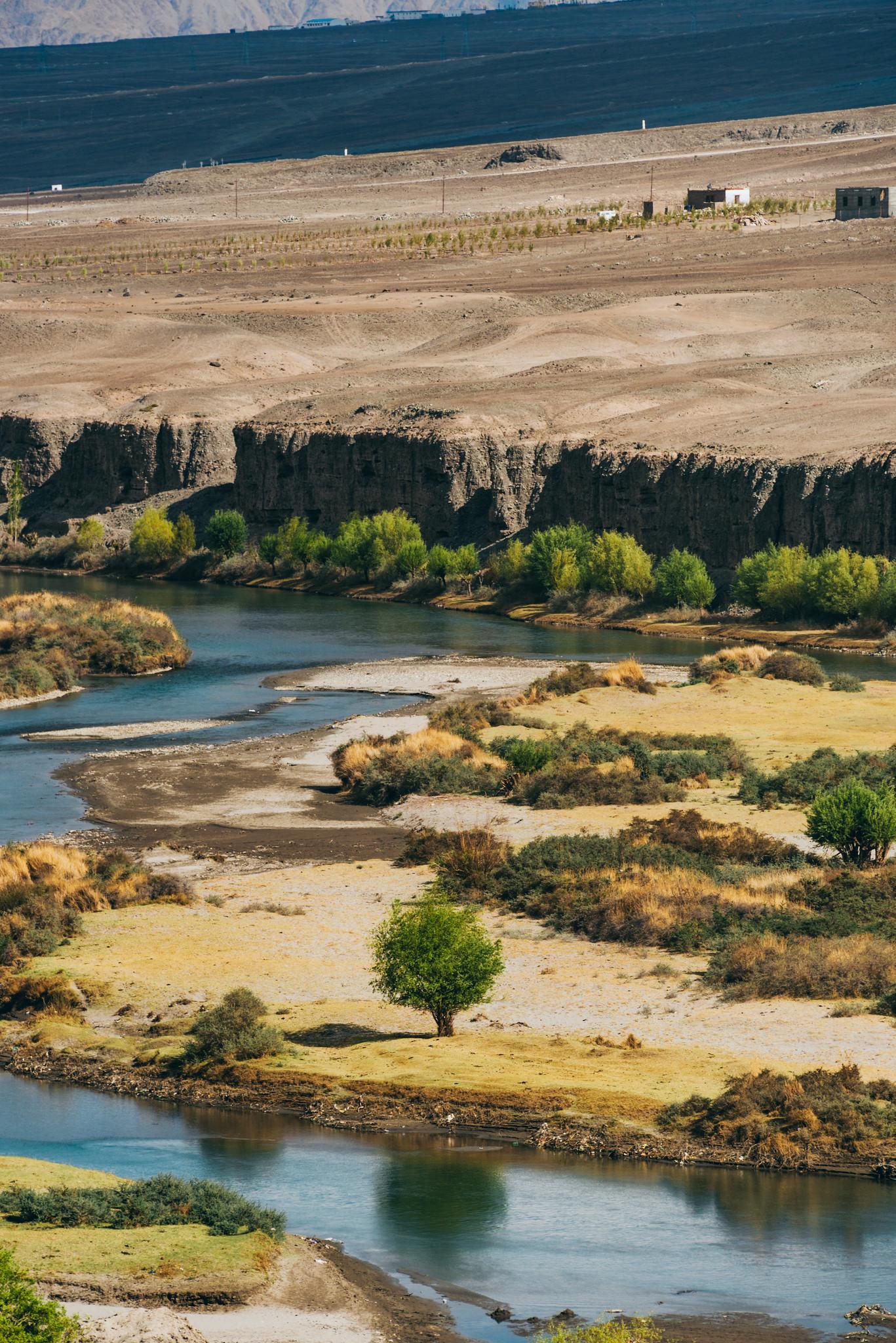
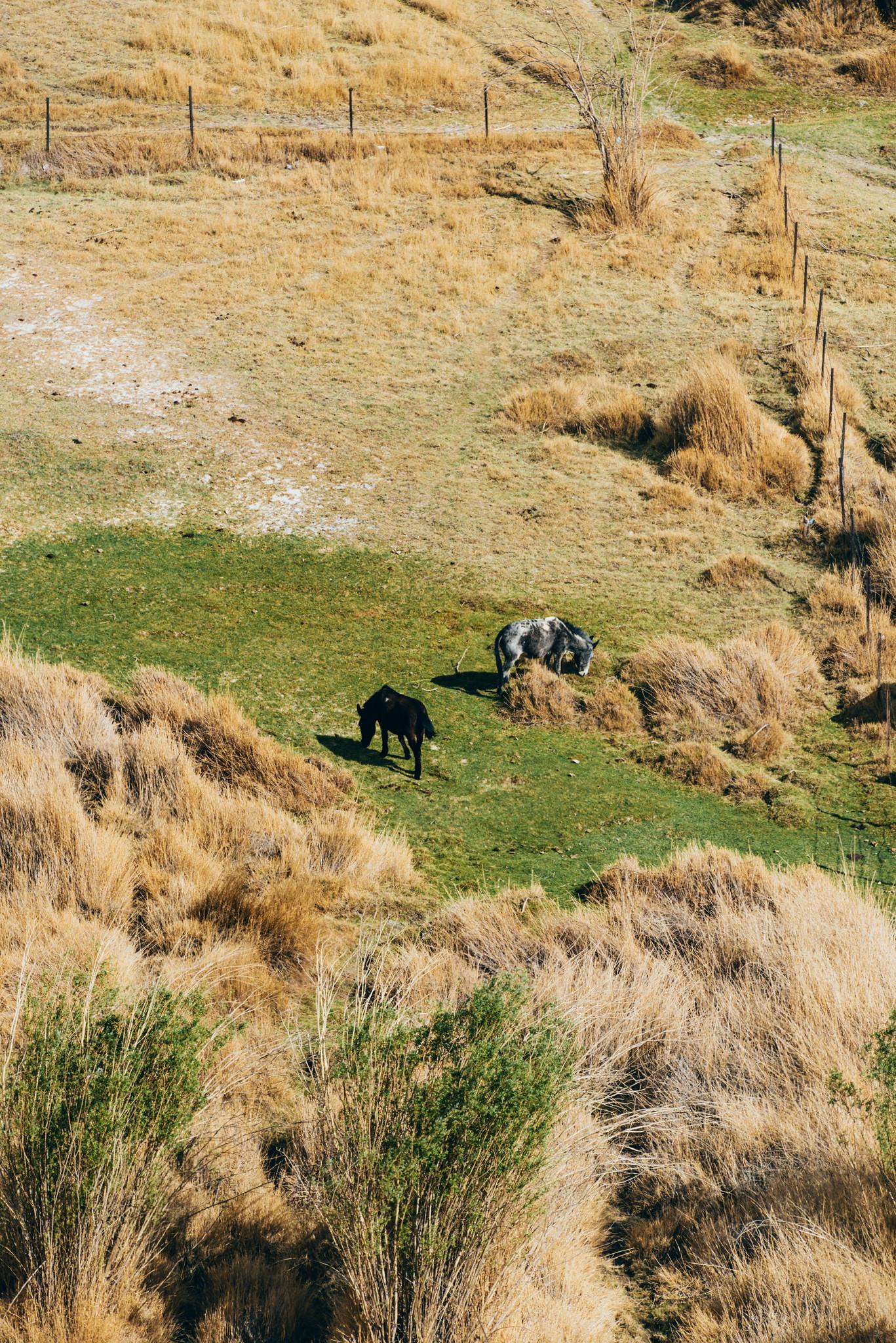
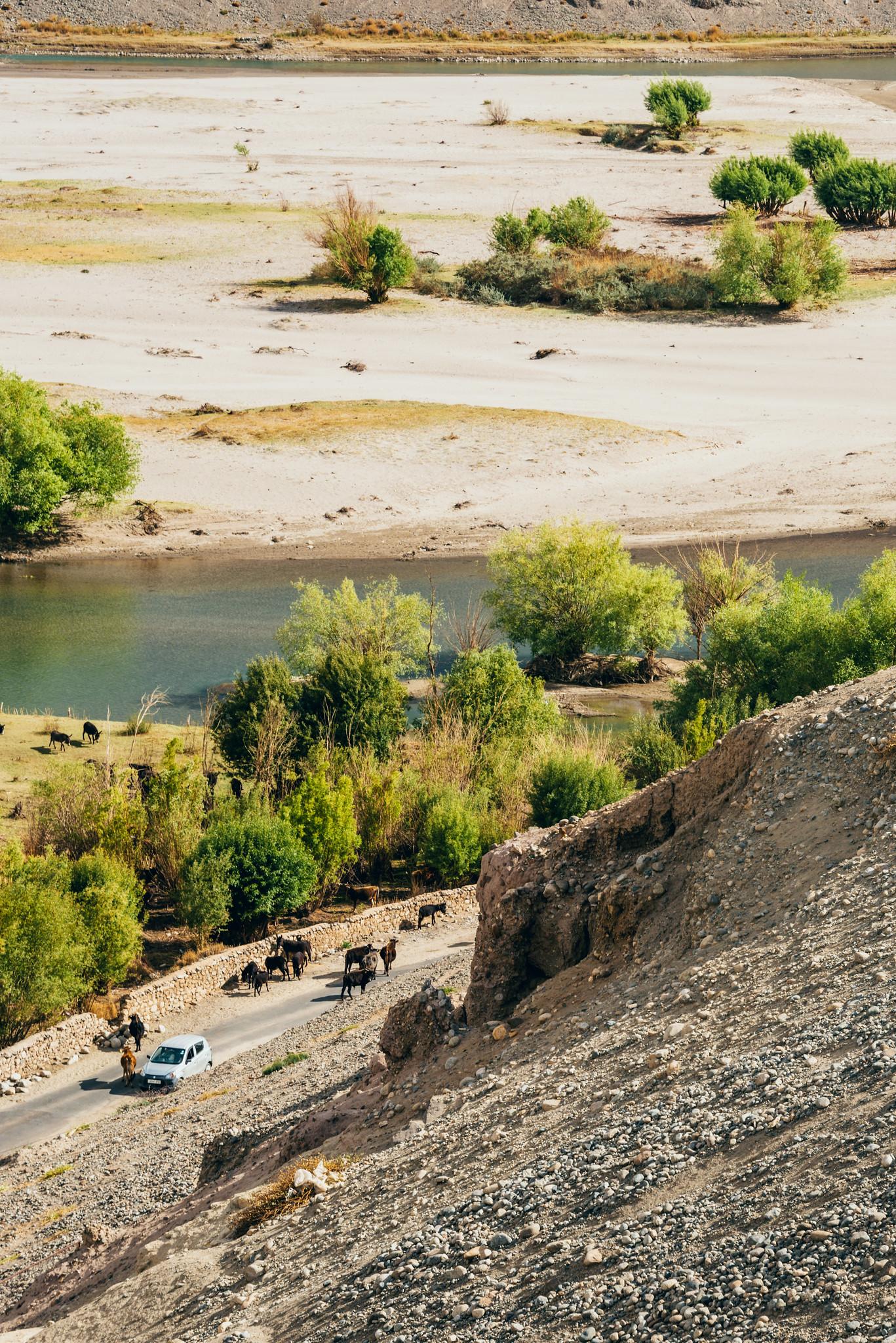
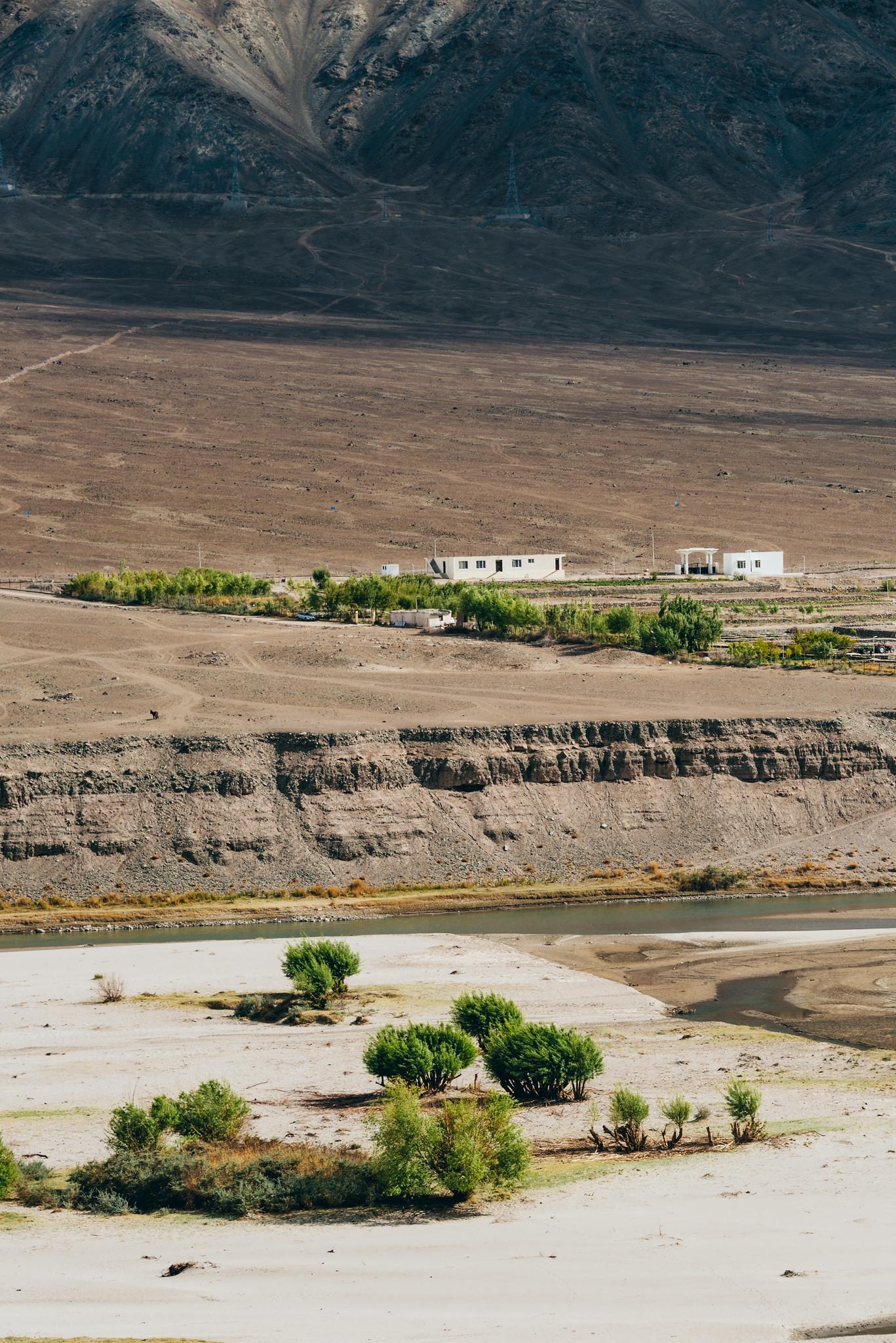
The blazing (but chill) sun might have made the captured scene less wonderful a bit, but it couldn’t stop me from asking the driver to drop me midway, to rape my camera trigger button.
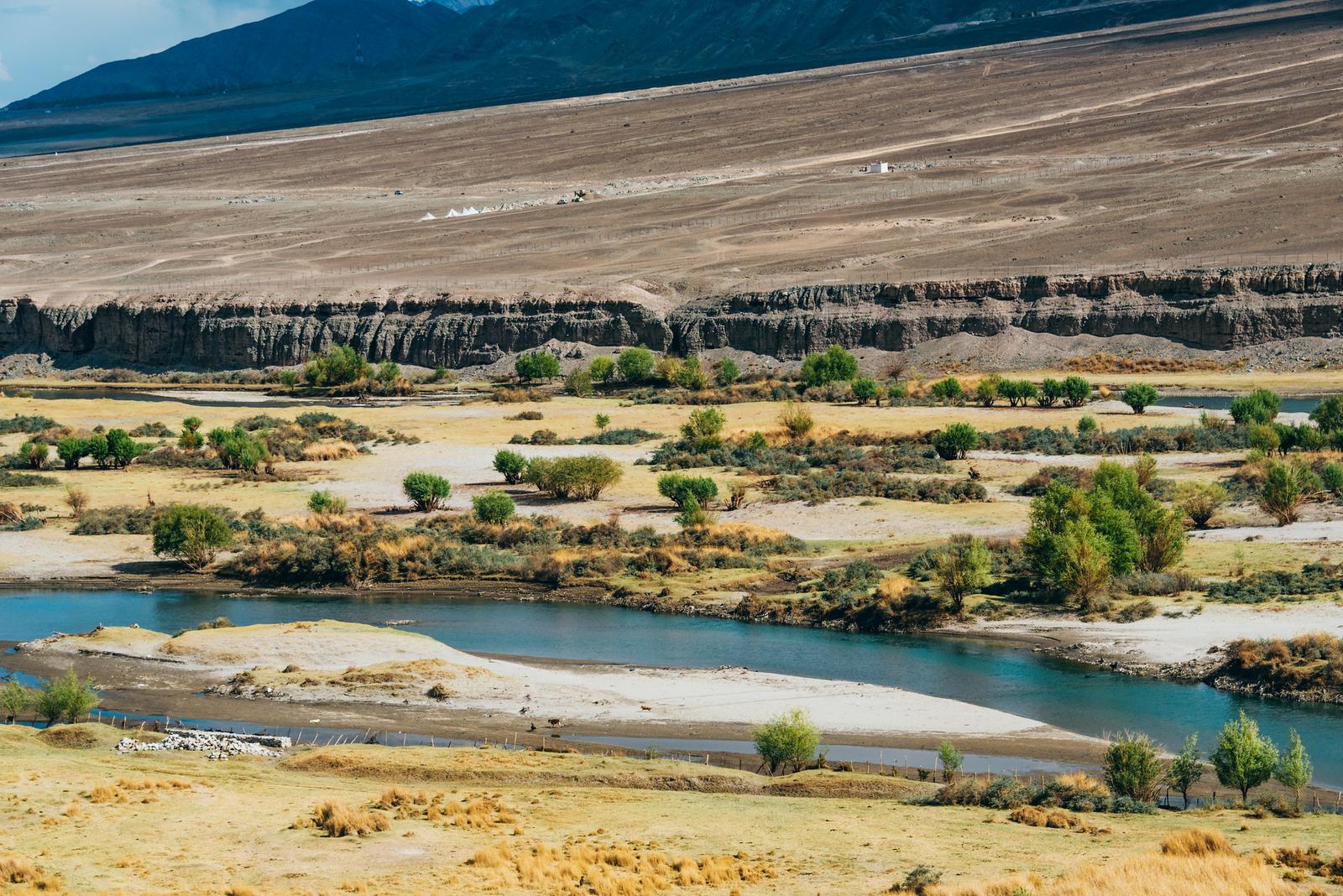
Crossing the Cold Desert
It’s around mid-afternoon that we continued advancing towards Sangam. The greeneries were gradually replaced with cold desert and signature colorful mountains, illuminated by ripe sunlight in golden hours. Up and down the winding passes, the scene never ceased to amaze us.
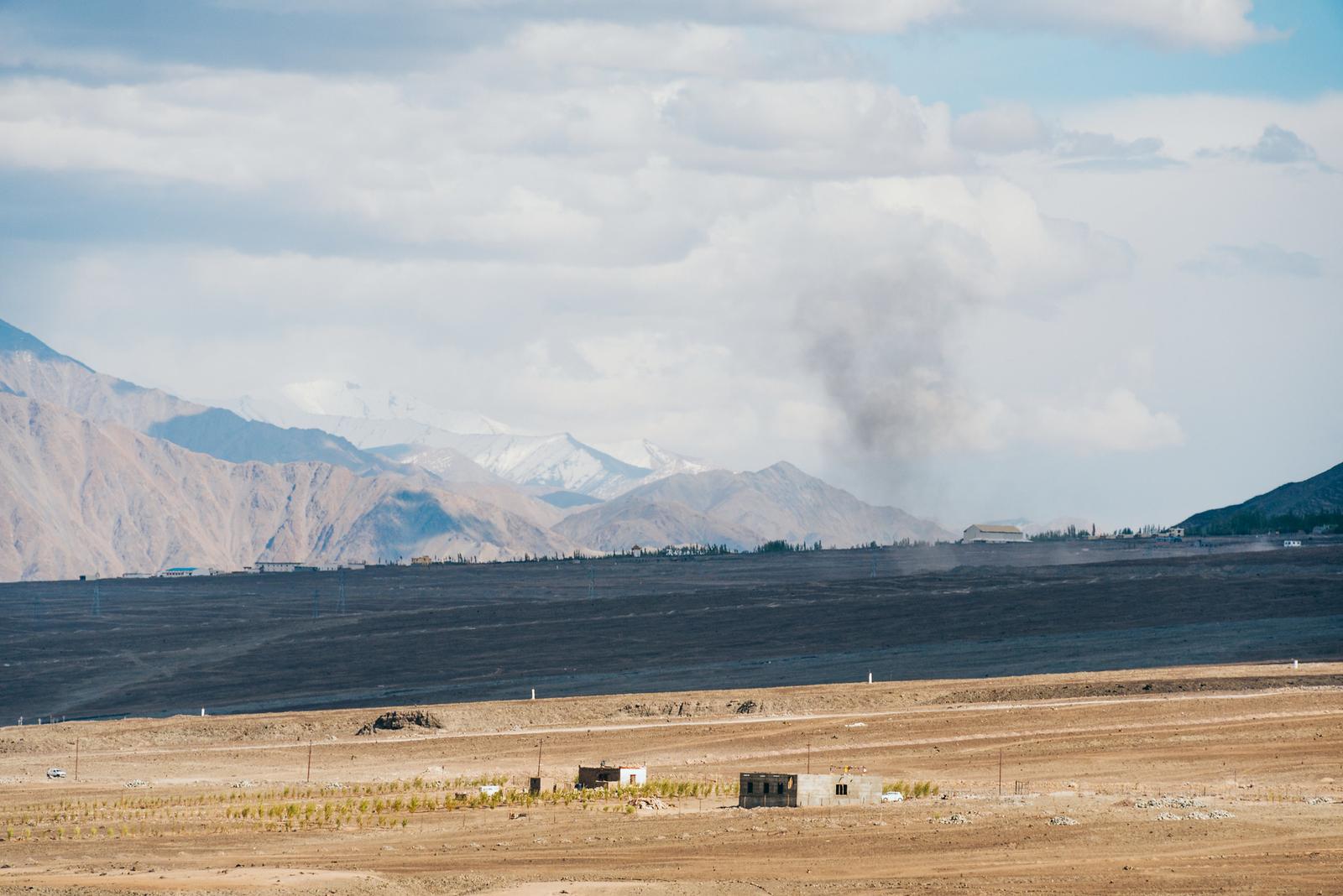
If compared to the distance covered on the following days, this first crossing was a breeze. To a newcomer here, each second on the road was all well spent.
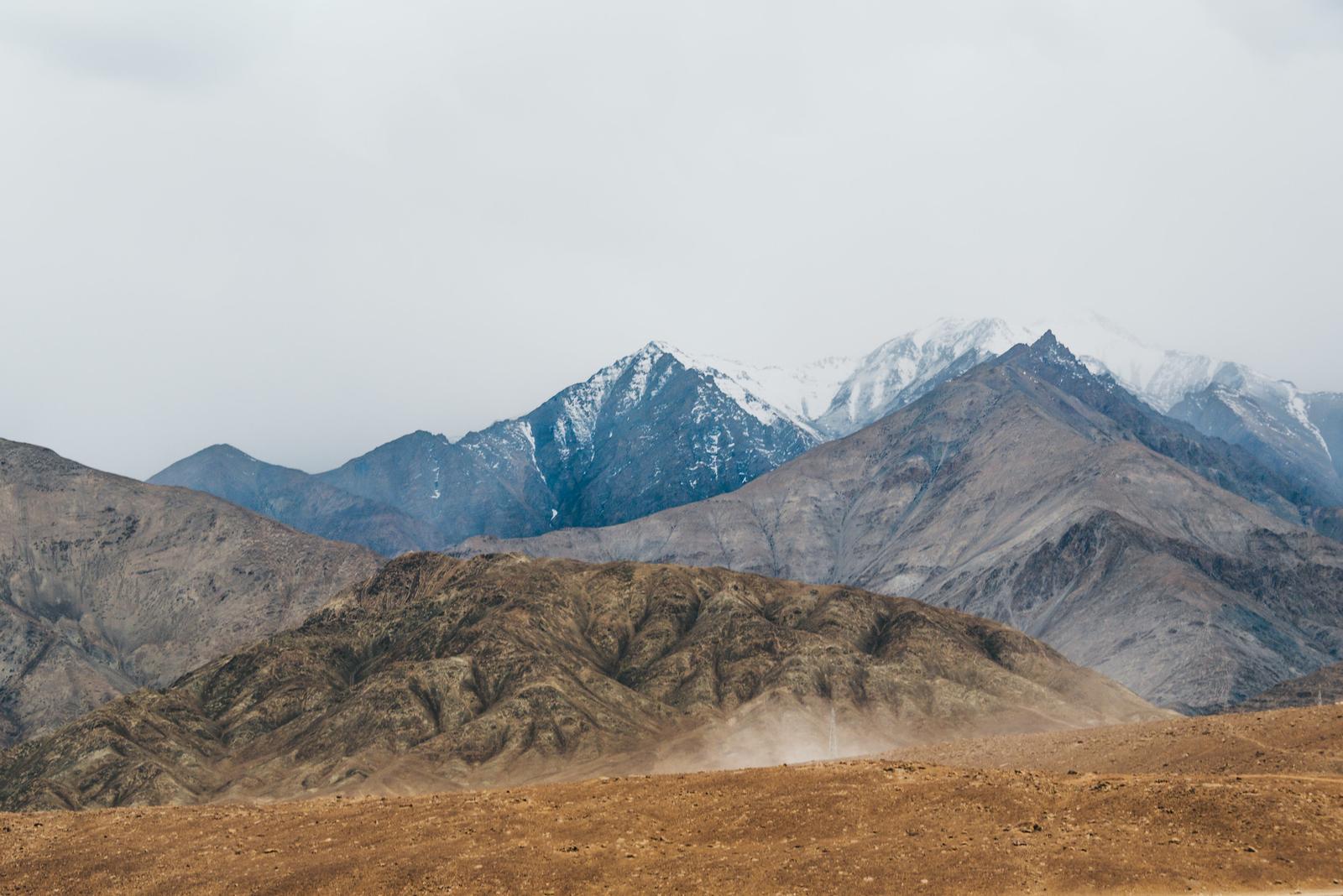
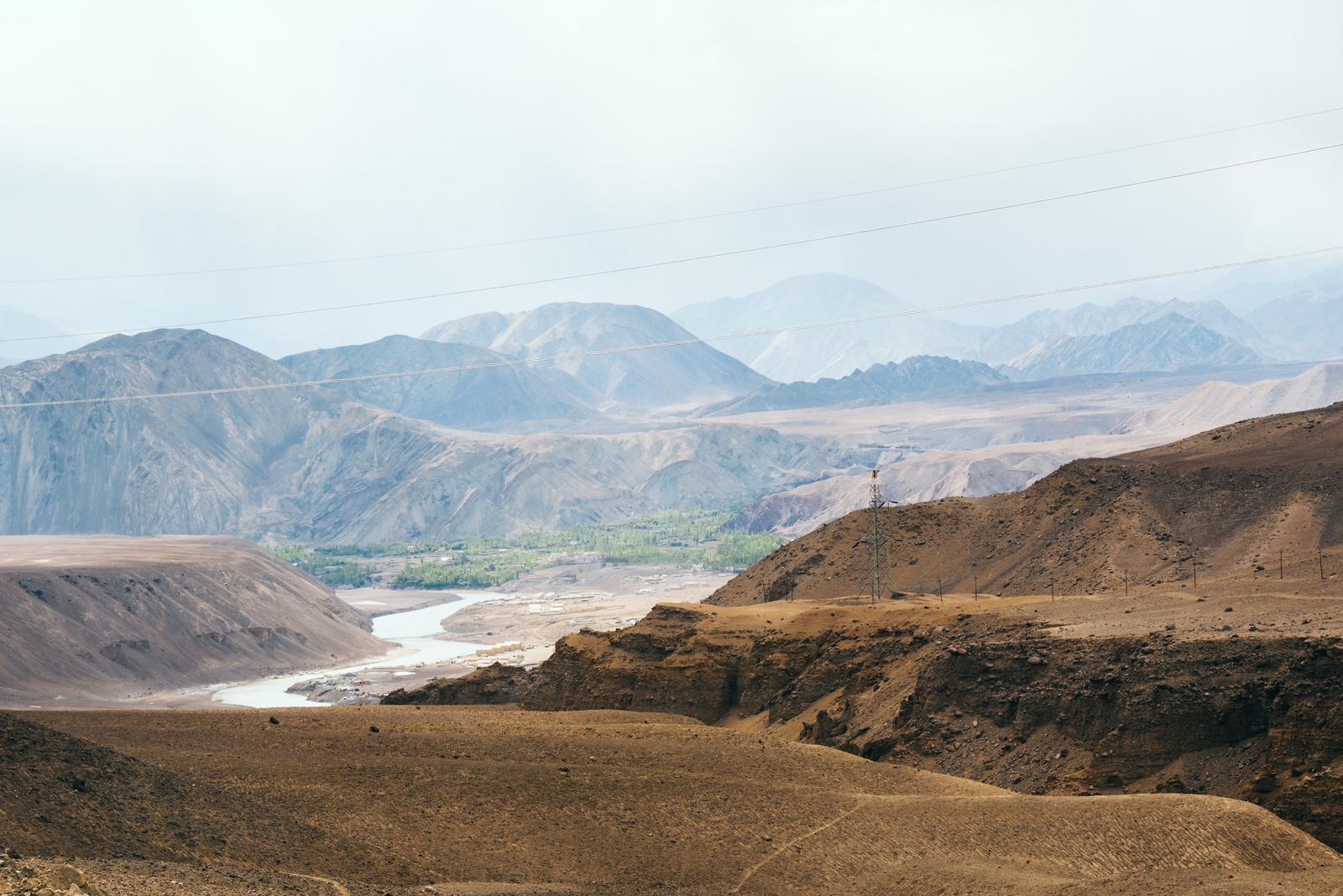
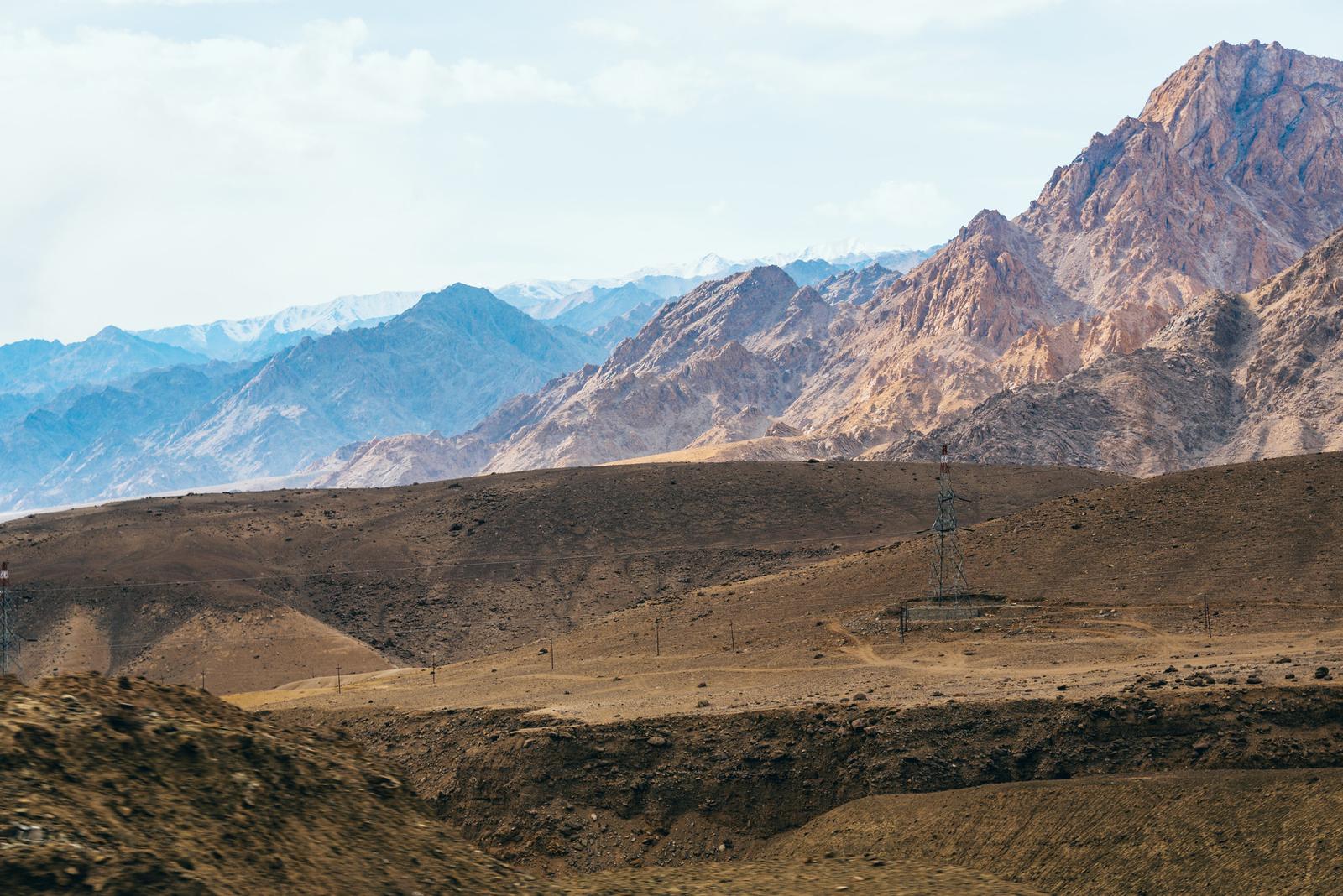
One highlighted location is Magnetic Hill, near Sangam - 26.5km west of Leh. However it’s named, there’s no magical force at all, it’s just the optical illusion that when you go downhill, you seem to go uphill instead. After the driver released the gas pedal, the car would be still moving.
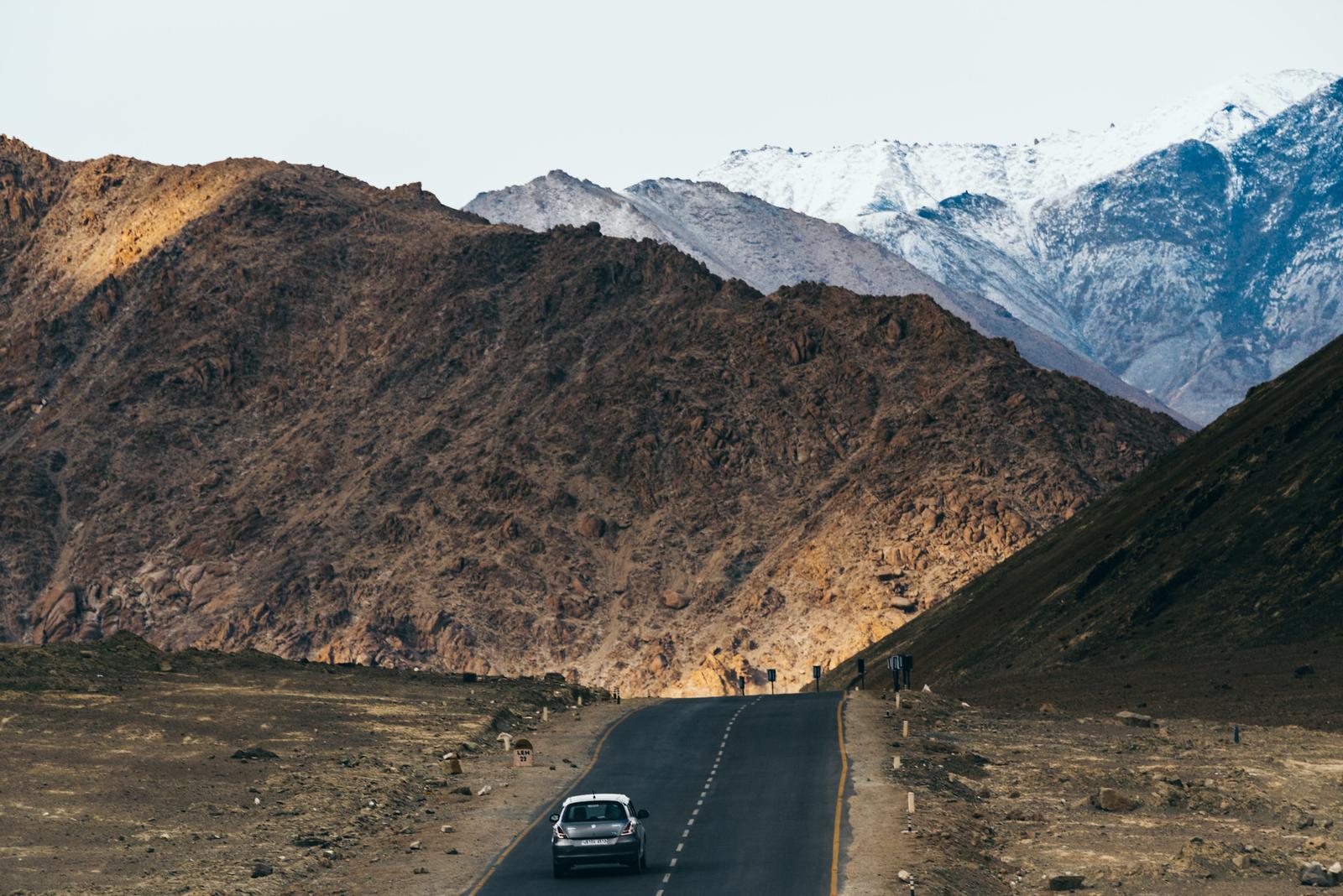
Reached the Confluence
Once the big yellow banner ‘BRO at your service. Pride of the nation. Hope you enjoyed the ride.’ is in sight, that let you know the Sangam is within a few hundred meters.
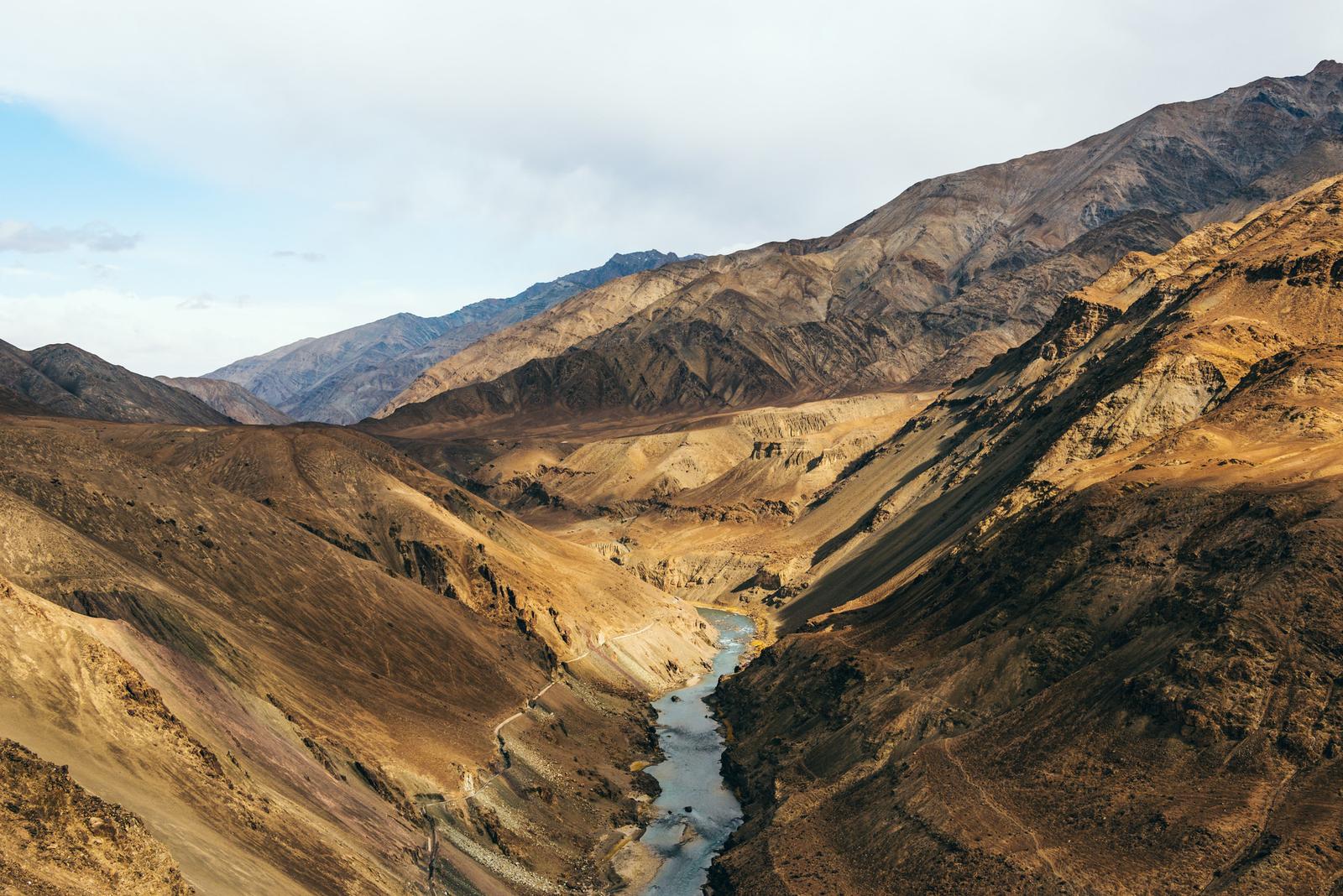
Finally we reached Sangam, the confluence point of Indus and Zanskar rivers. It’s hard to imagine that we stood somewhere at the start of the famous Indus River, one of the two (along with Ganges) being the lifeline of one earliest human civilization. The river will course up north, then make a U-turn to the south in Pakistan and discharge into Indian Ocean. Water here will be frozen when winter comes.
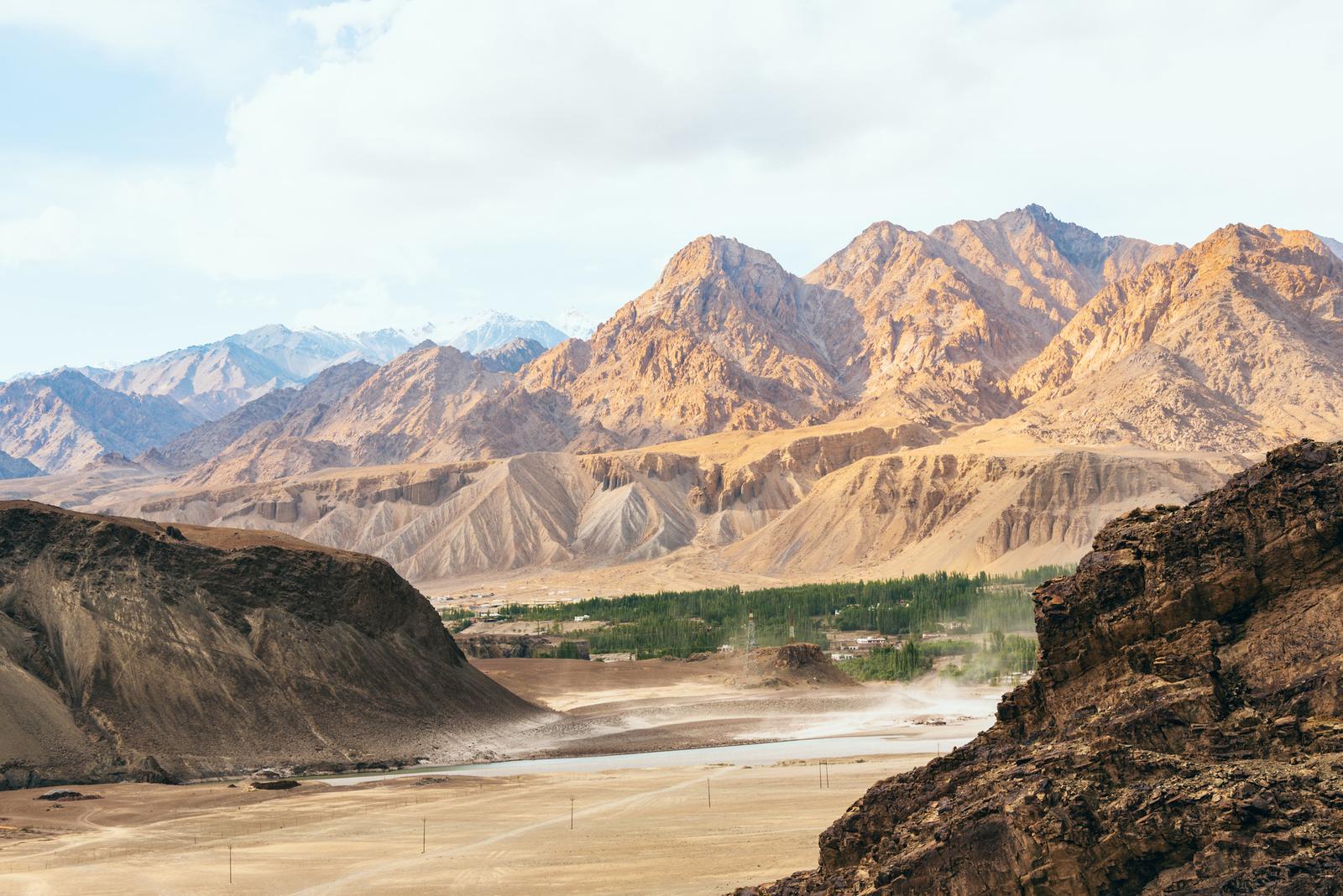
The driver drove a bit further north, then U-turned to Zanskar Valley Road, which is at lower level. At this point we could see the beautifully curved streamline and asphalt road, situated between the mighty mountains.
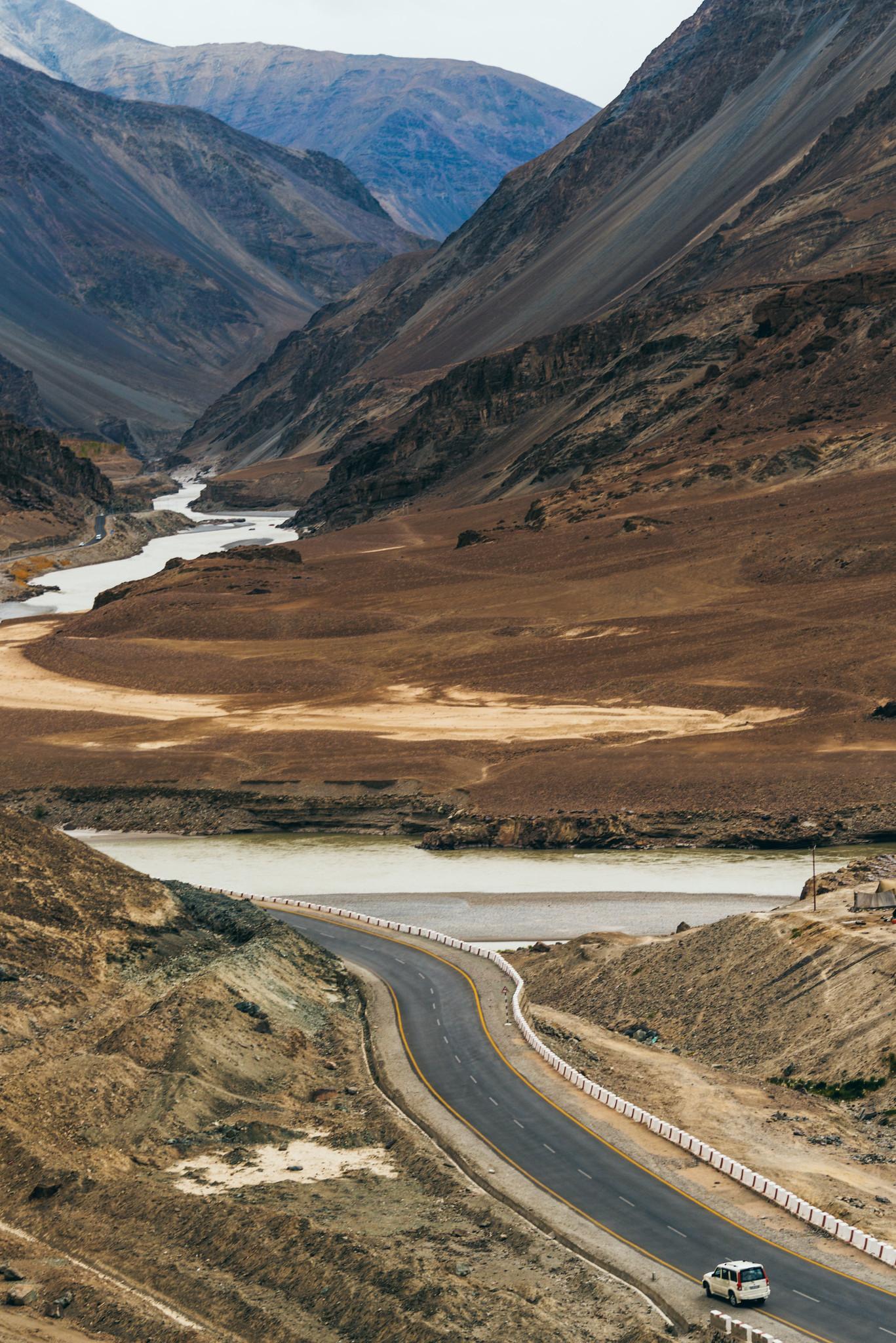
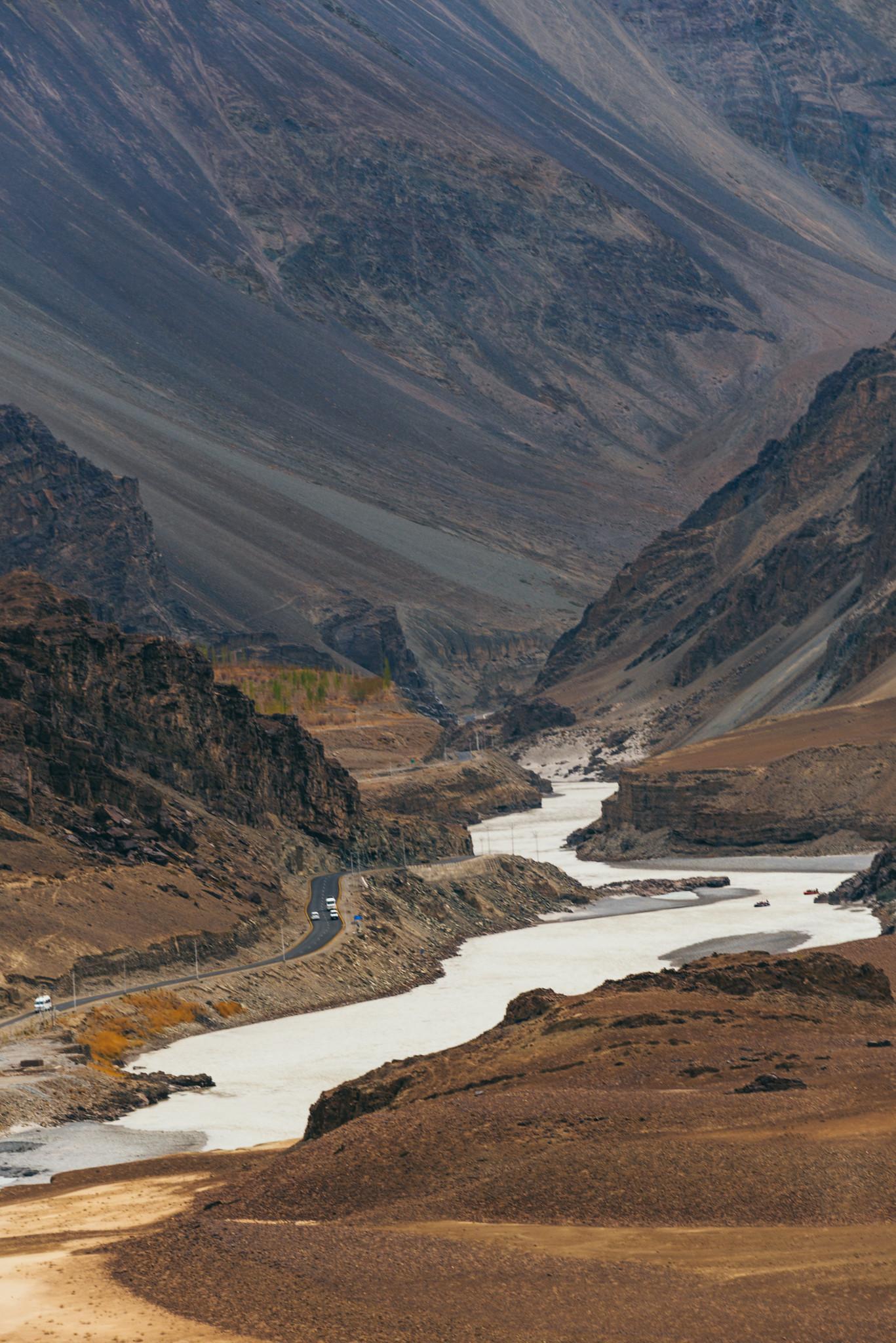
…as well as Leg Zanskar Bridge:
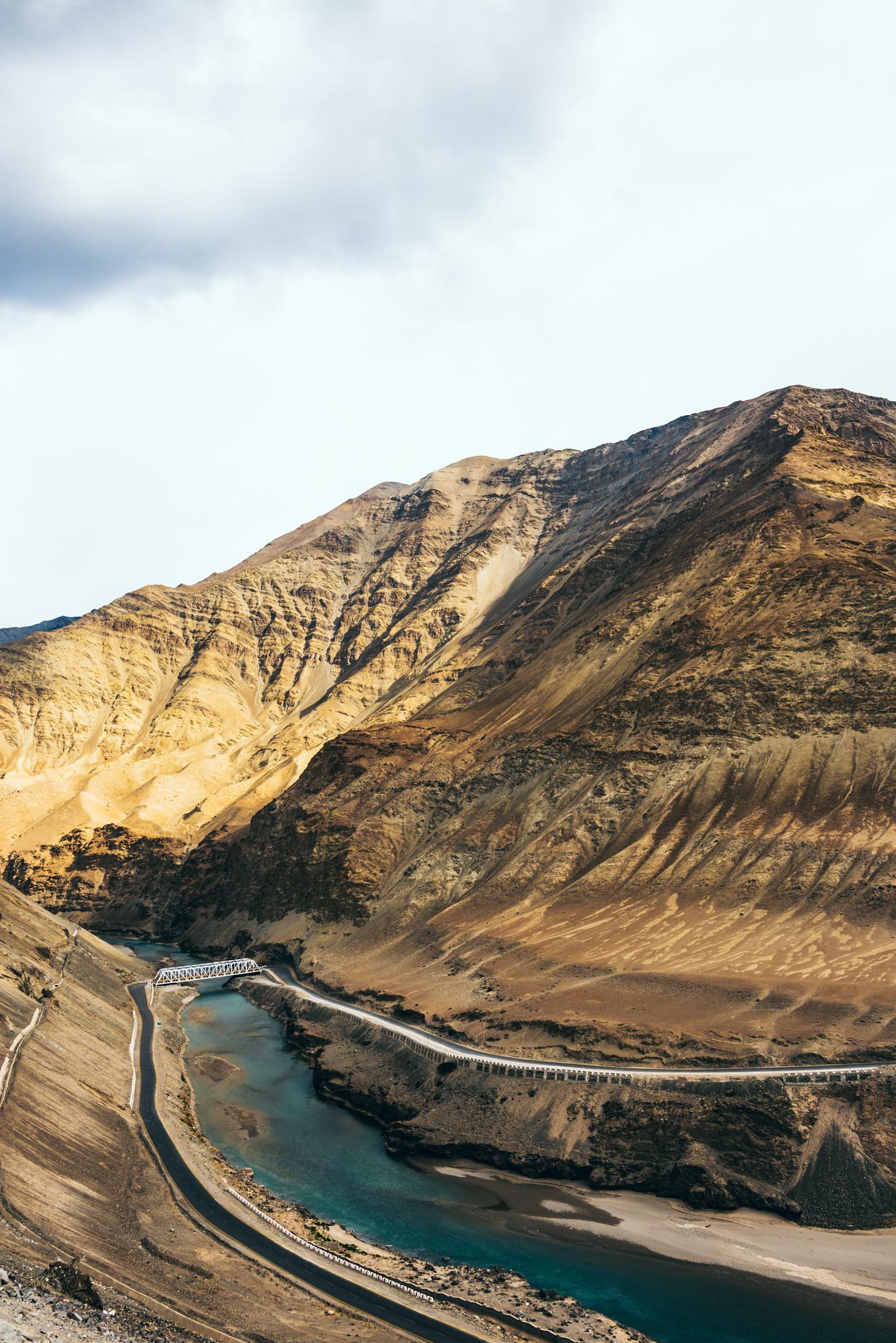
So he dropped me at the Sangam viewpoint, there’s a canteen that we could have a small breaktime, so I energized myself with a bottle of orange juice. Leisurely strolling about, and beheld a scene staying forever in my mind: a happy dog family sleeping in front of the magnificence, cuddling each other to fight against the cold weather.
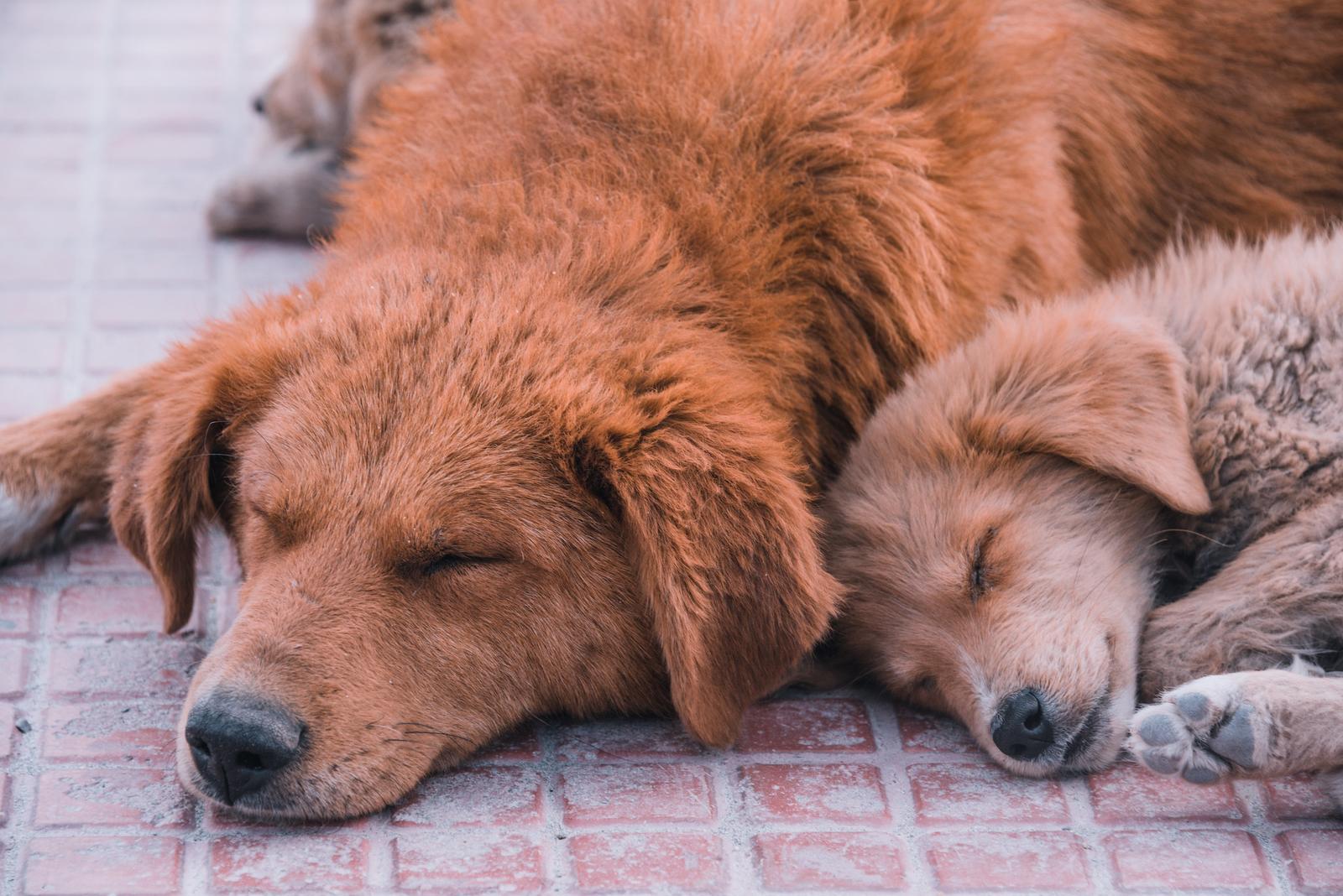
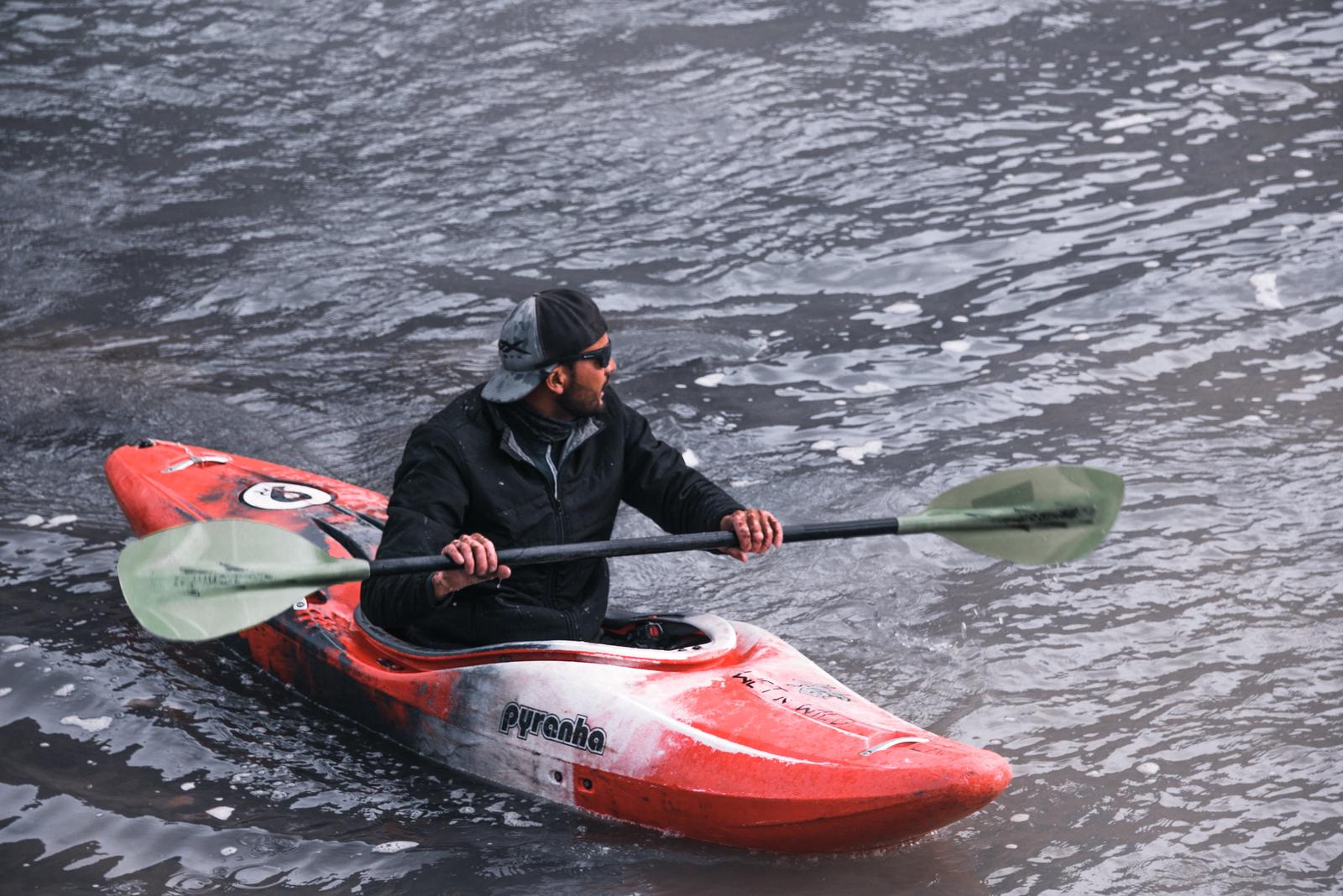
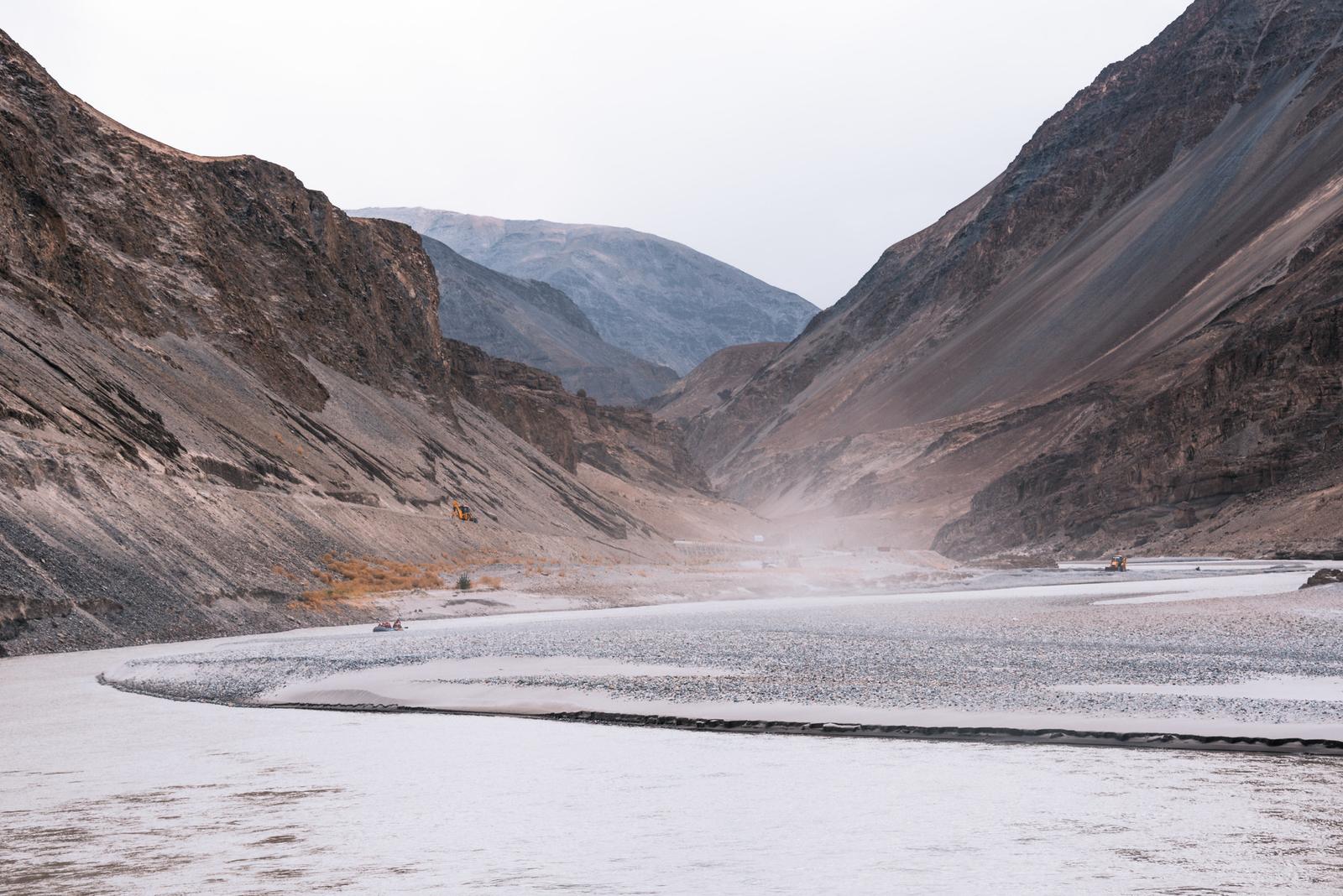
Back to Leh
It’s approaching sunset time when we got back on track to Leh. The scenery was returned with the golden hues as the cloud had been cleared. With dusty road effect, the photos taken were smoothened. Here and there we could see the fearless bikes blading through the sand dunes.
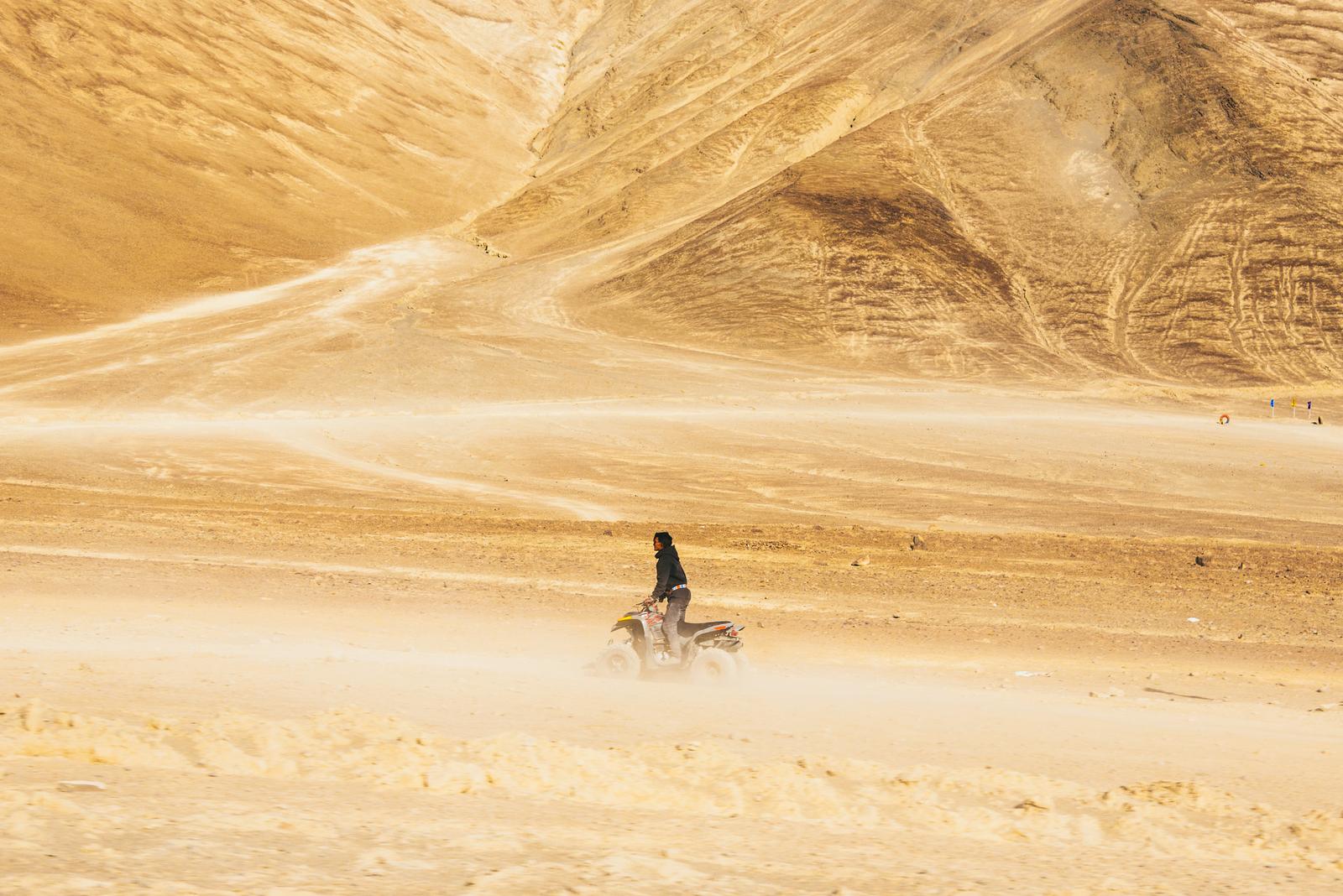
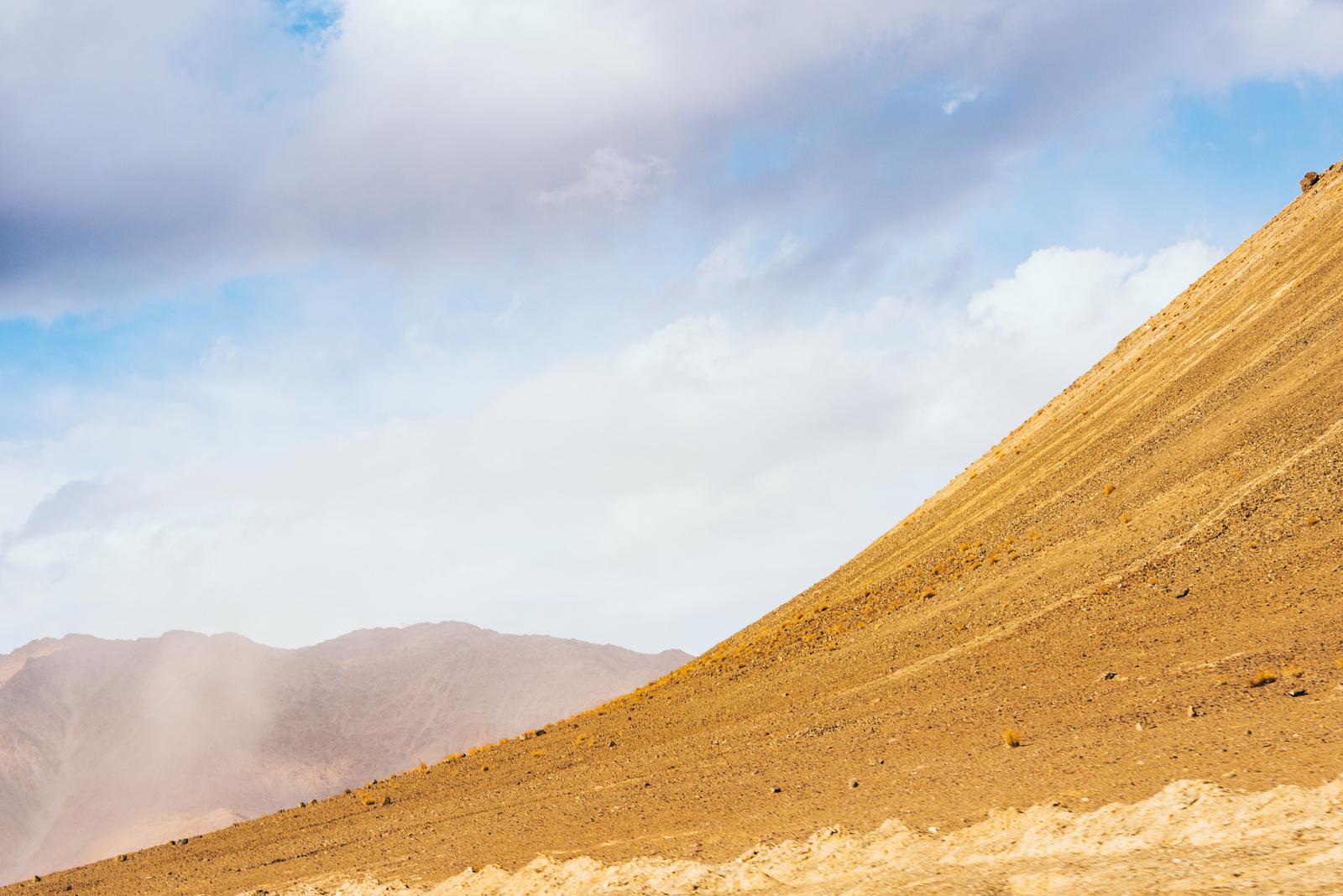
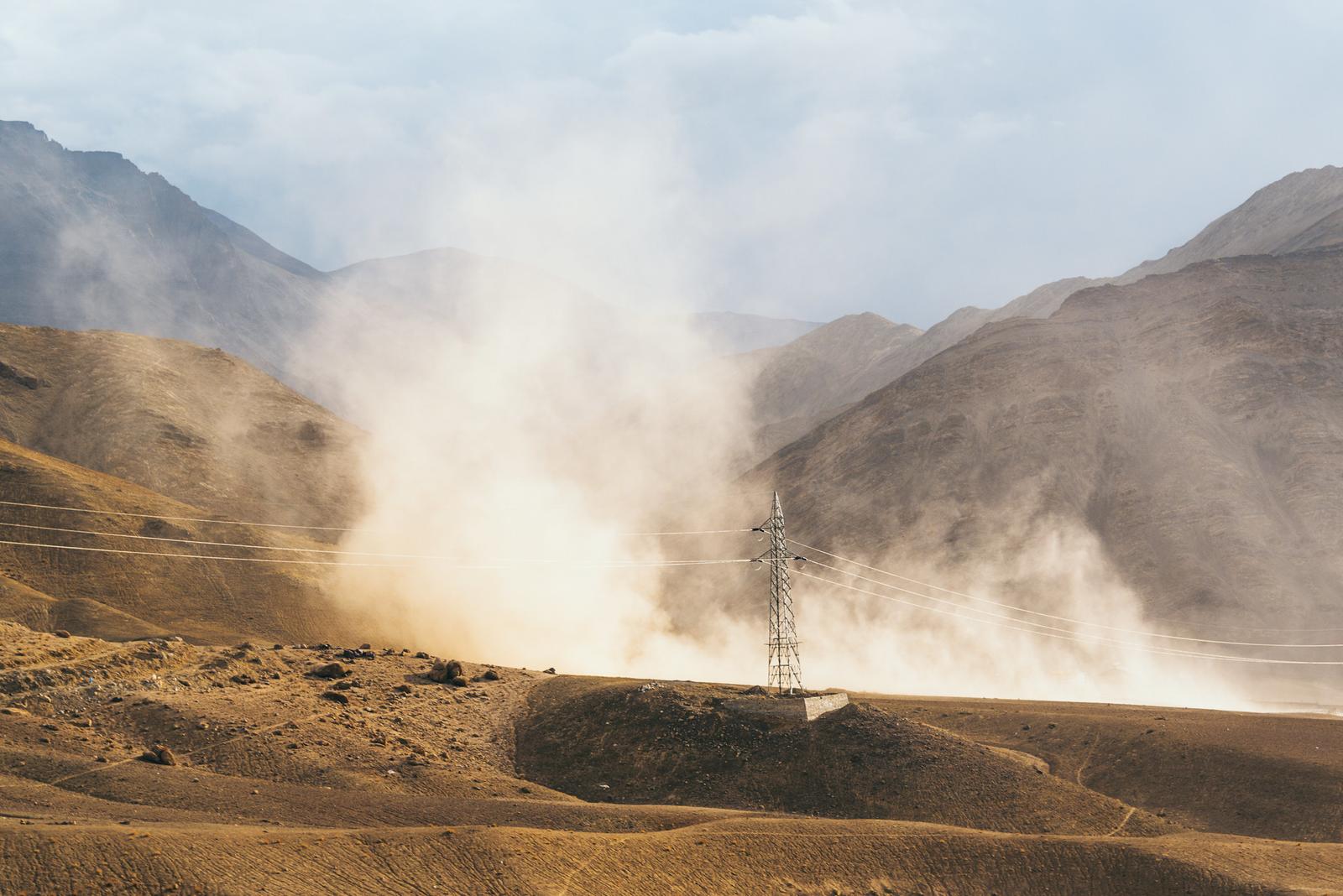
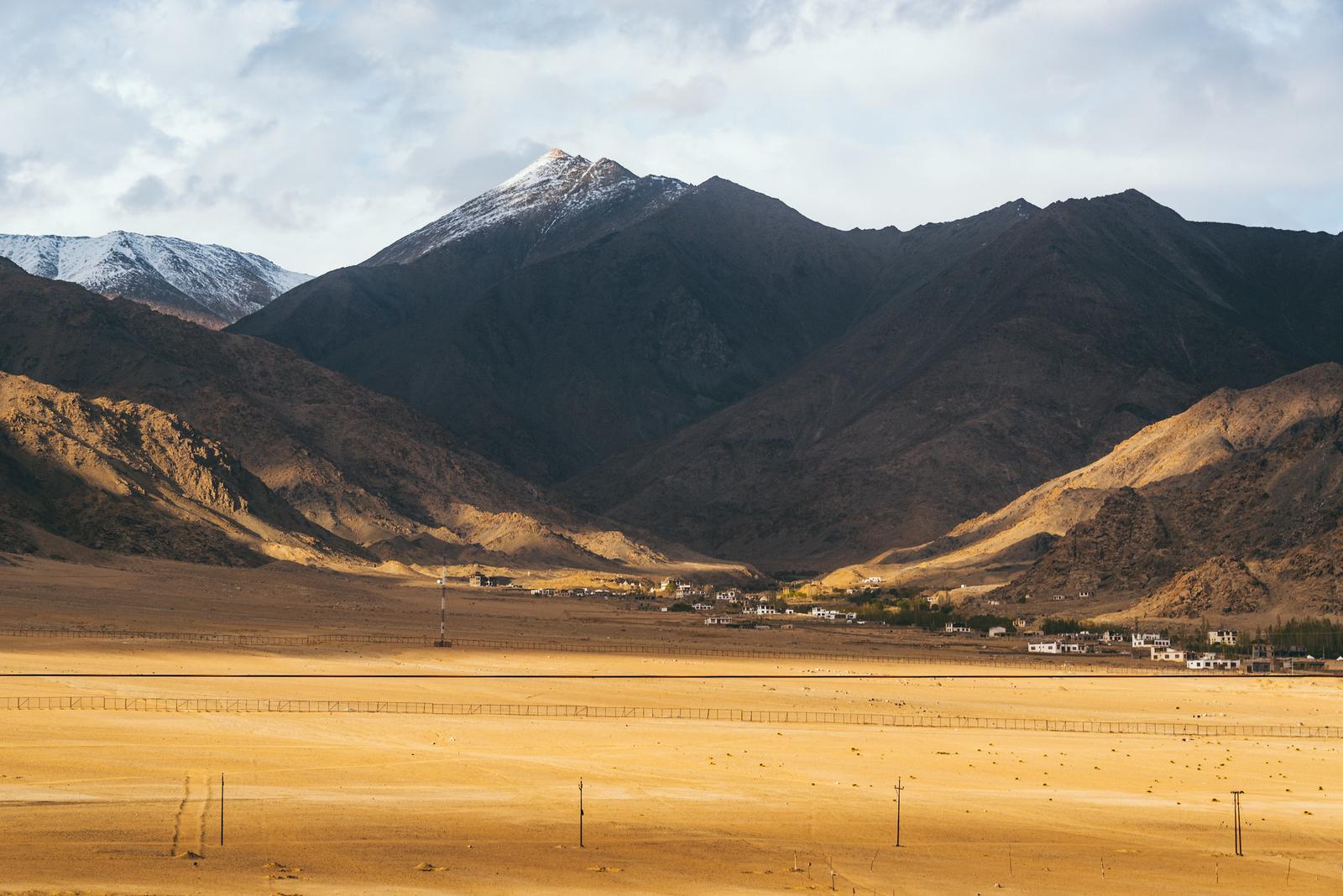
Ranges of mountains were illuminated then reflected back a variety of shades, based on rock formation, casted shadow and light direction.
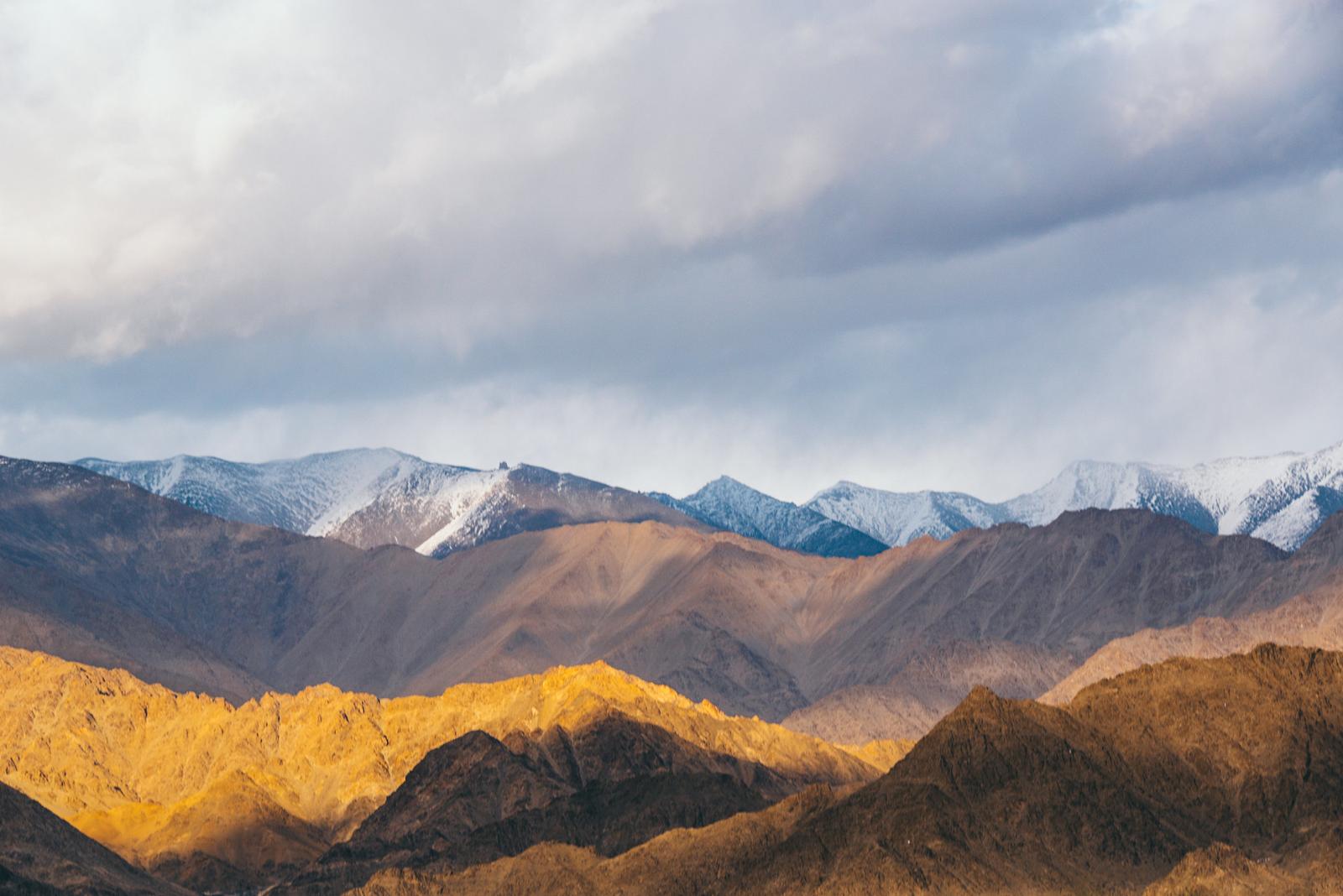
Namgyal Tsemo Monastery
I asked my driver to go for Namgyal Tsemo Monastery, the last destination of the day. Situated on a hill to the east of city center, it gave us a panoramic view of Leh.
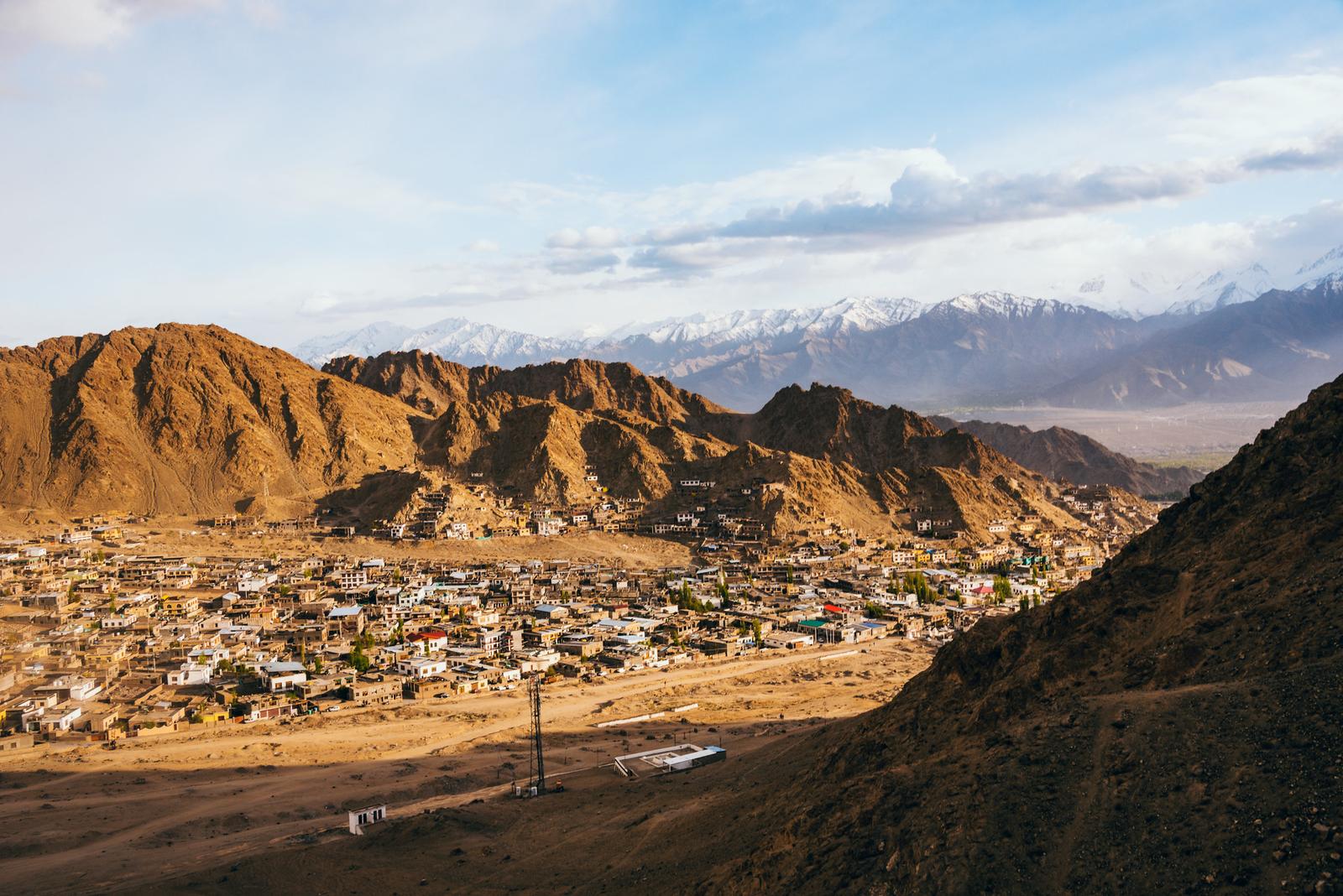
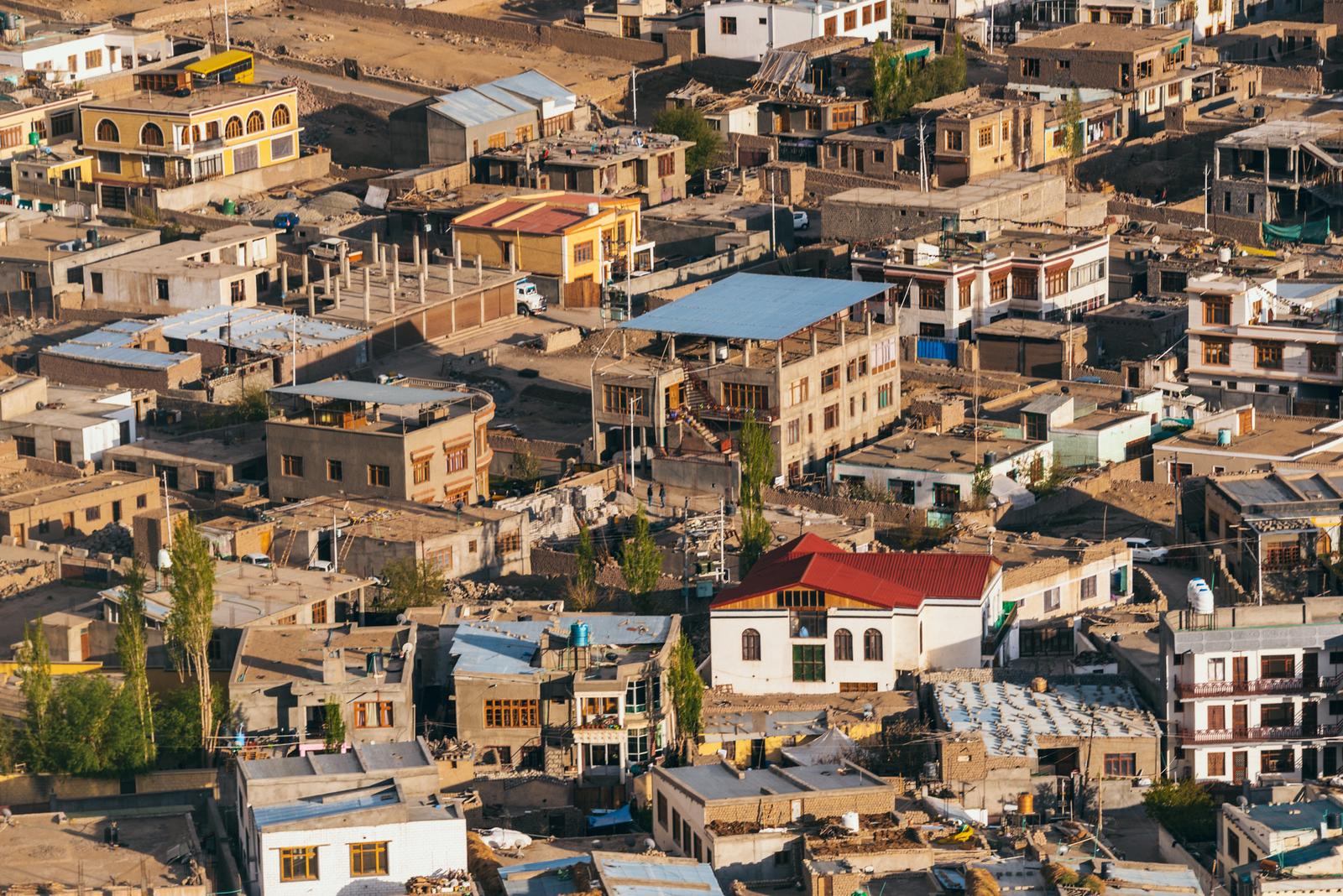
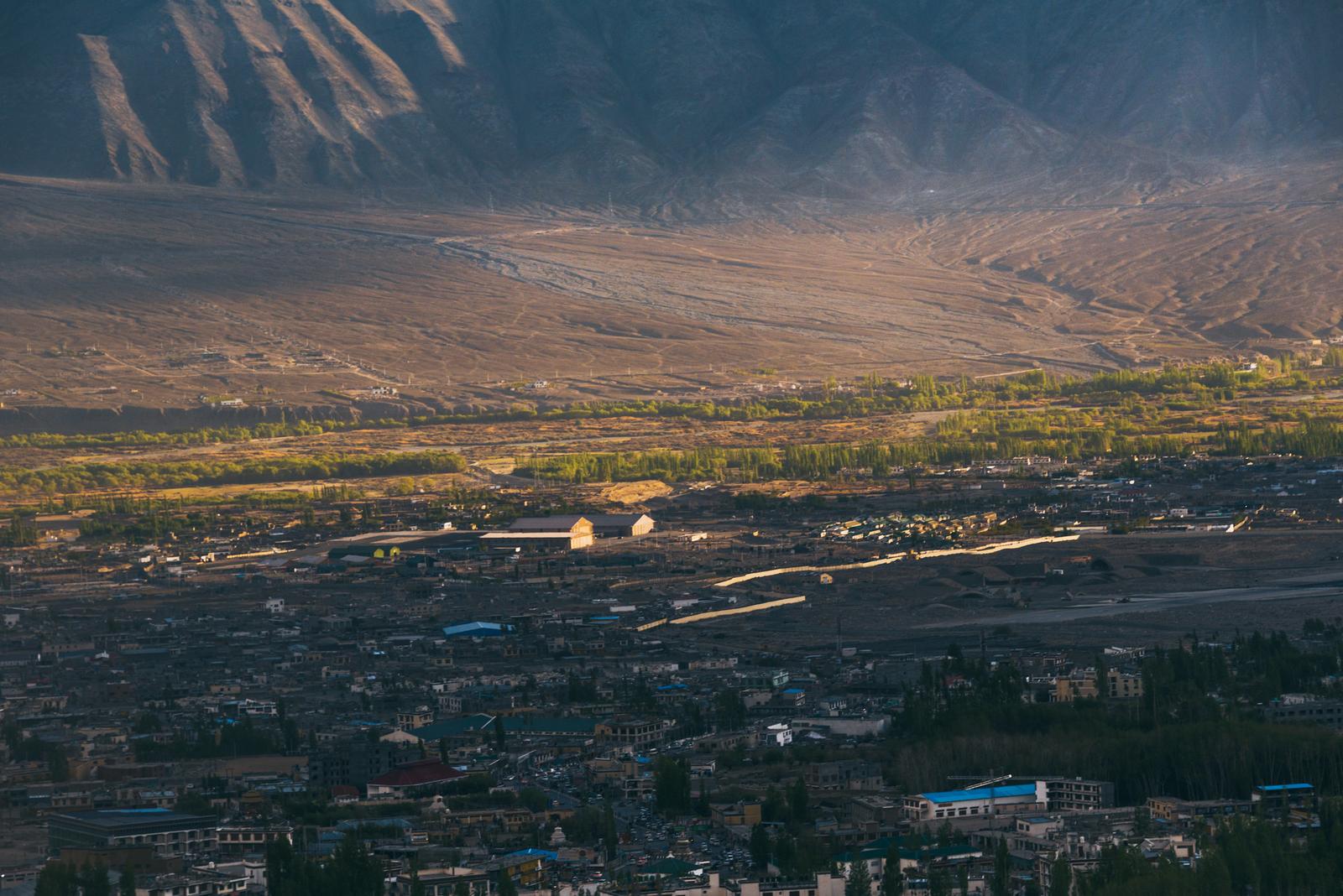
As usual, it’s all planned to bring myself into such golden moment.
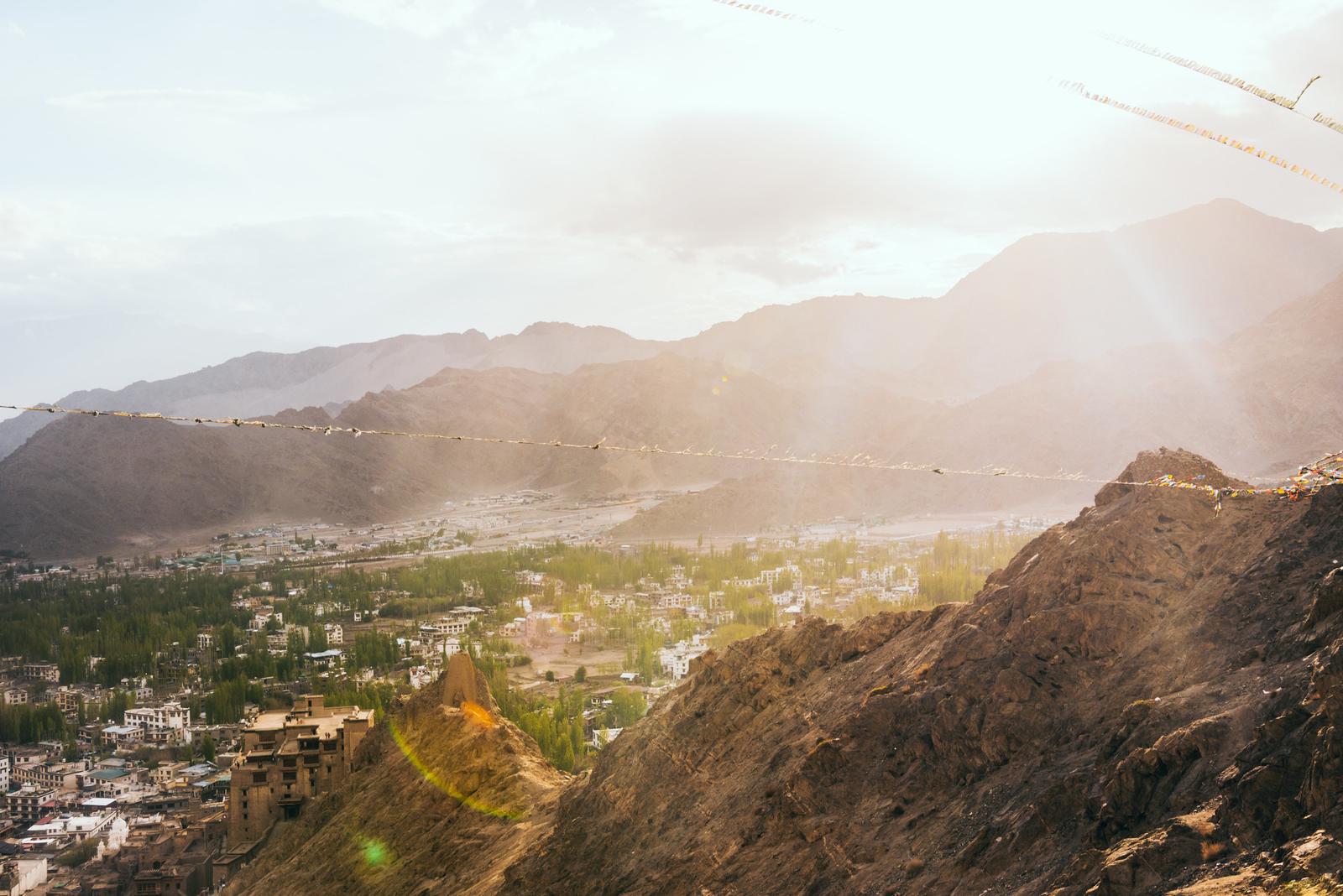
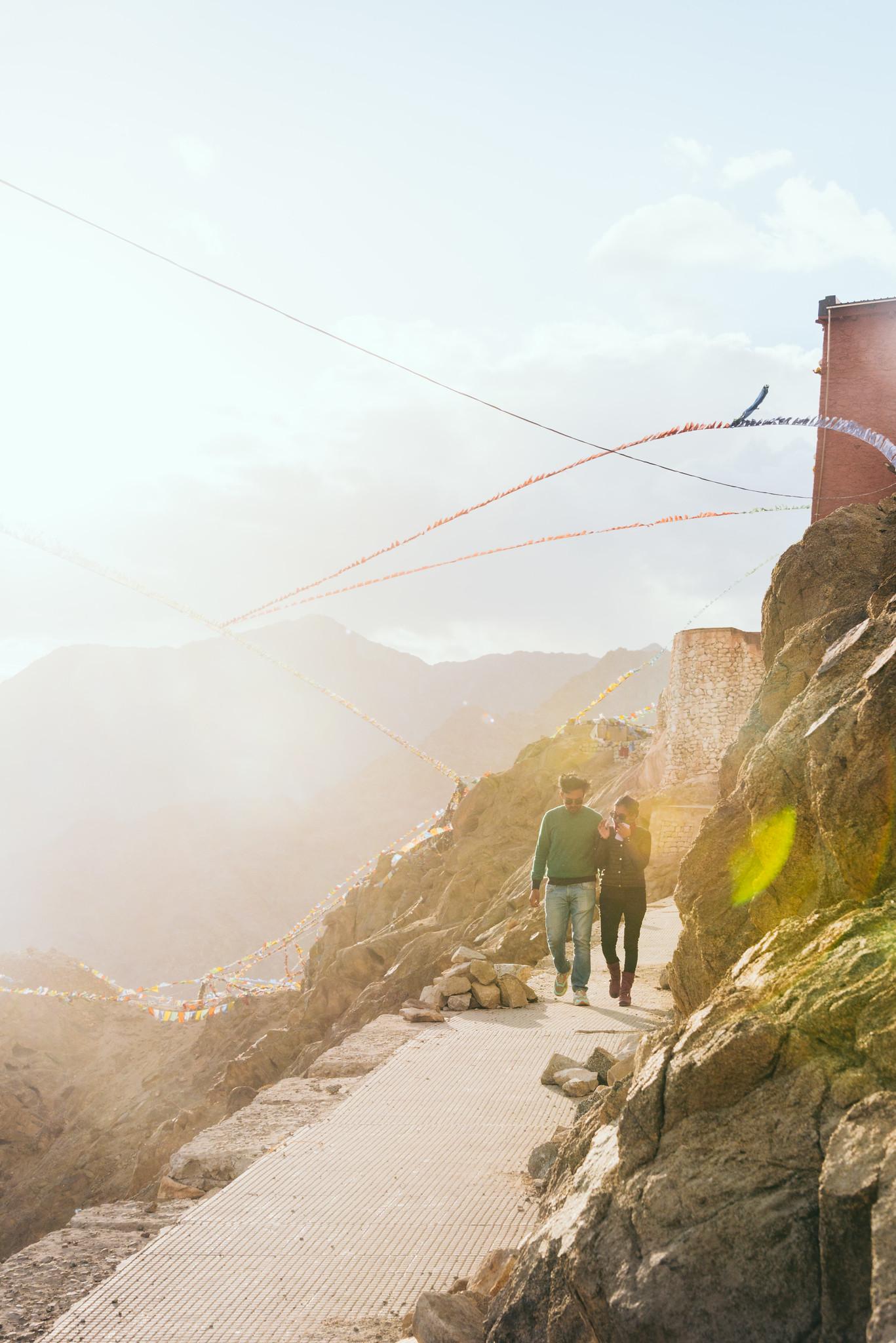
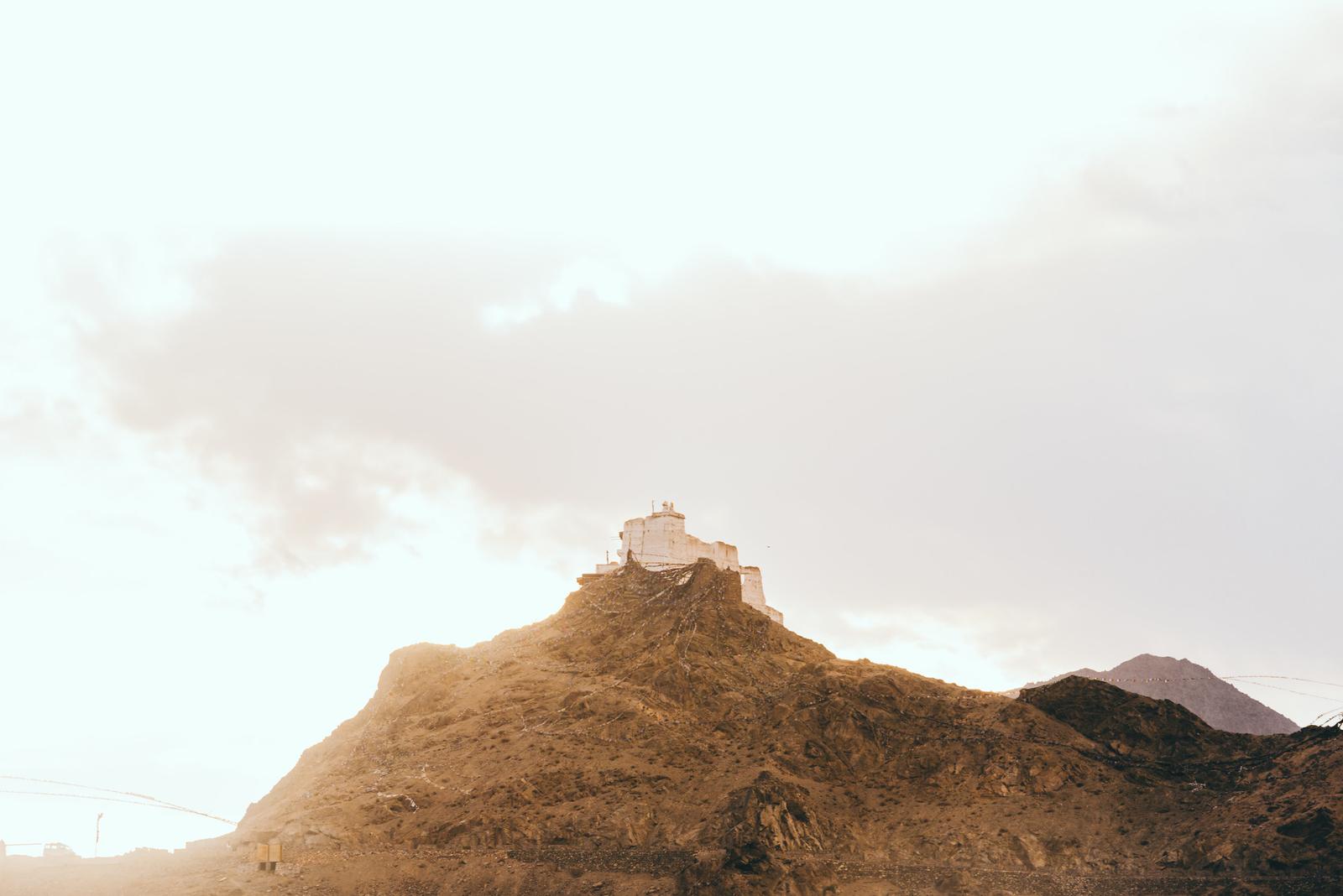
Leh Main Market
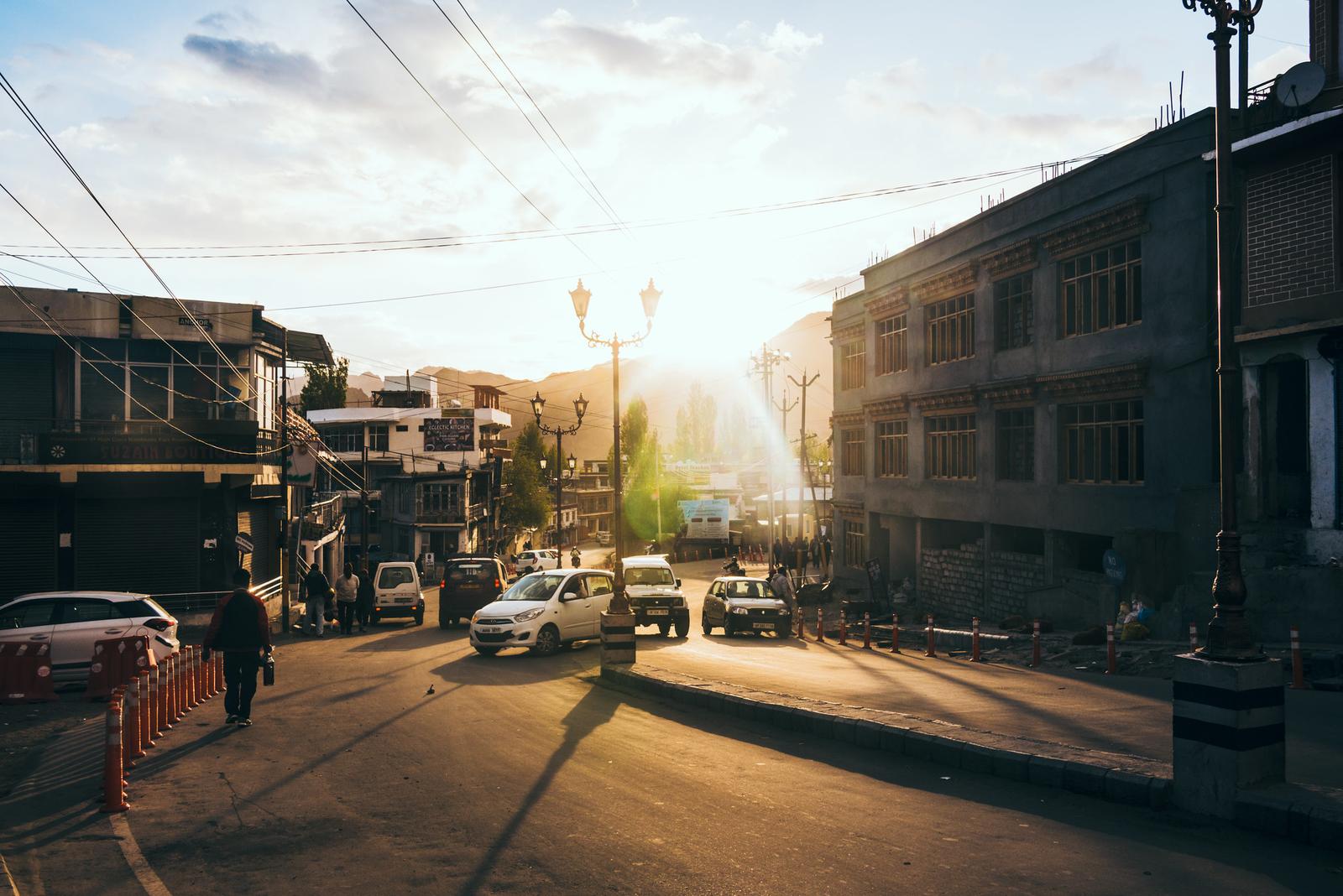
The driver dropped me near Leh Main Market, when it’s around 6pm and the wind chilled. Twilight didn’t hinder the crowded place from being vibrant. The market’s dated back to the 15th century, in the era of King Singe Namgyal. From eatery, jewelry, textile, fanciful ornaments, religious materials to SIM card (very important), that should be the place to pack up your necessities before starting a not very comfortable journey ahead in the remote areas.
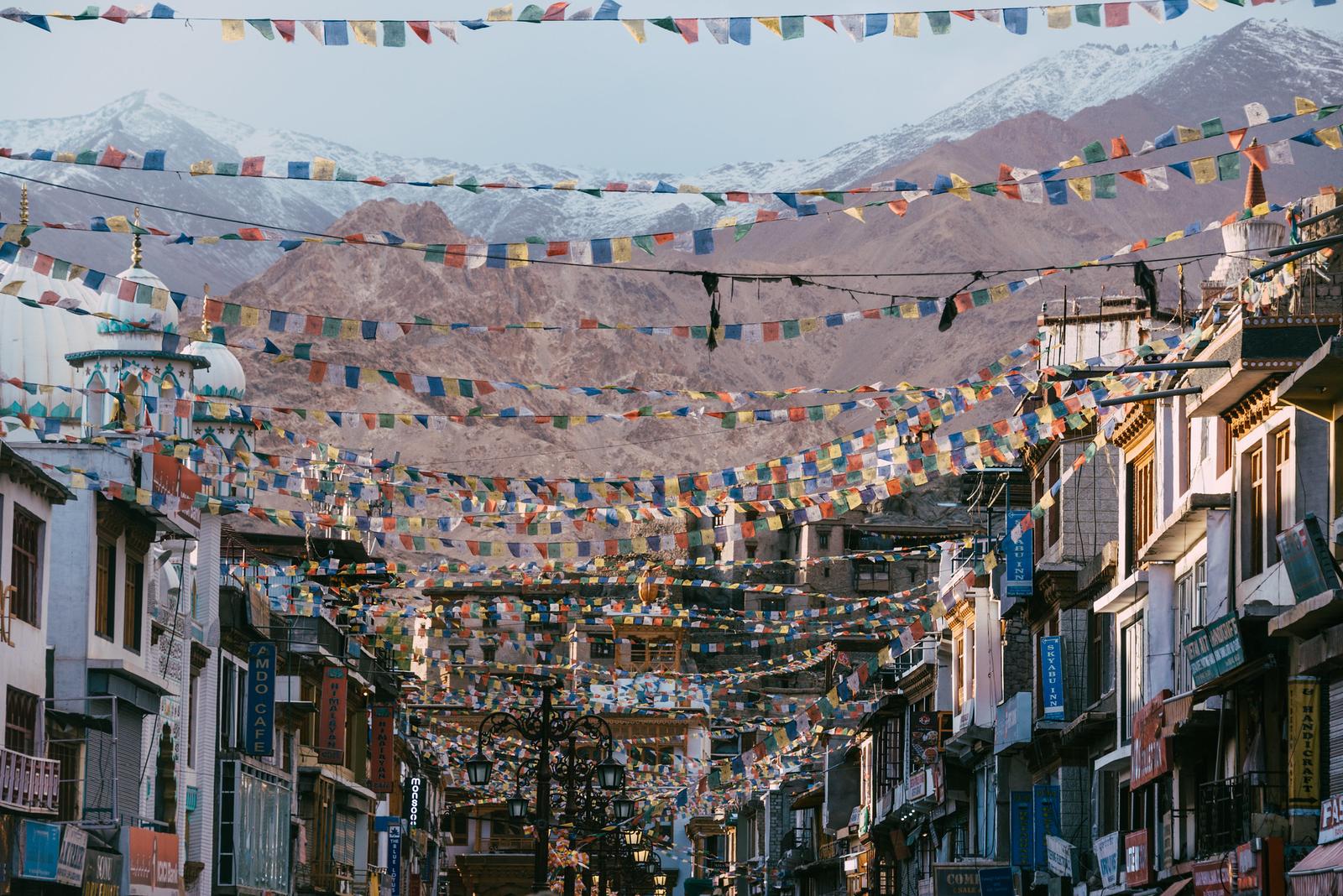
Some may say the place is filthy with stray dogs and beggars, but to my personal experience, it’s much cleaner and more peaceful than Delhi streets. Even it jogged my memories of the Bukhara bazaar walk three years before, or the Boudhanath circumambulation in 2017. You can observe a vibrant mingle of cultures here, the Tibetan Ladakhi monks, the Muslim, and some Indian from other parts of the country, all in one pedestrian street.
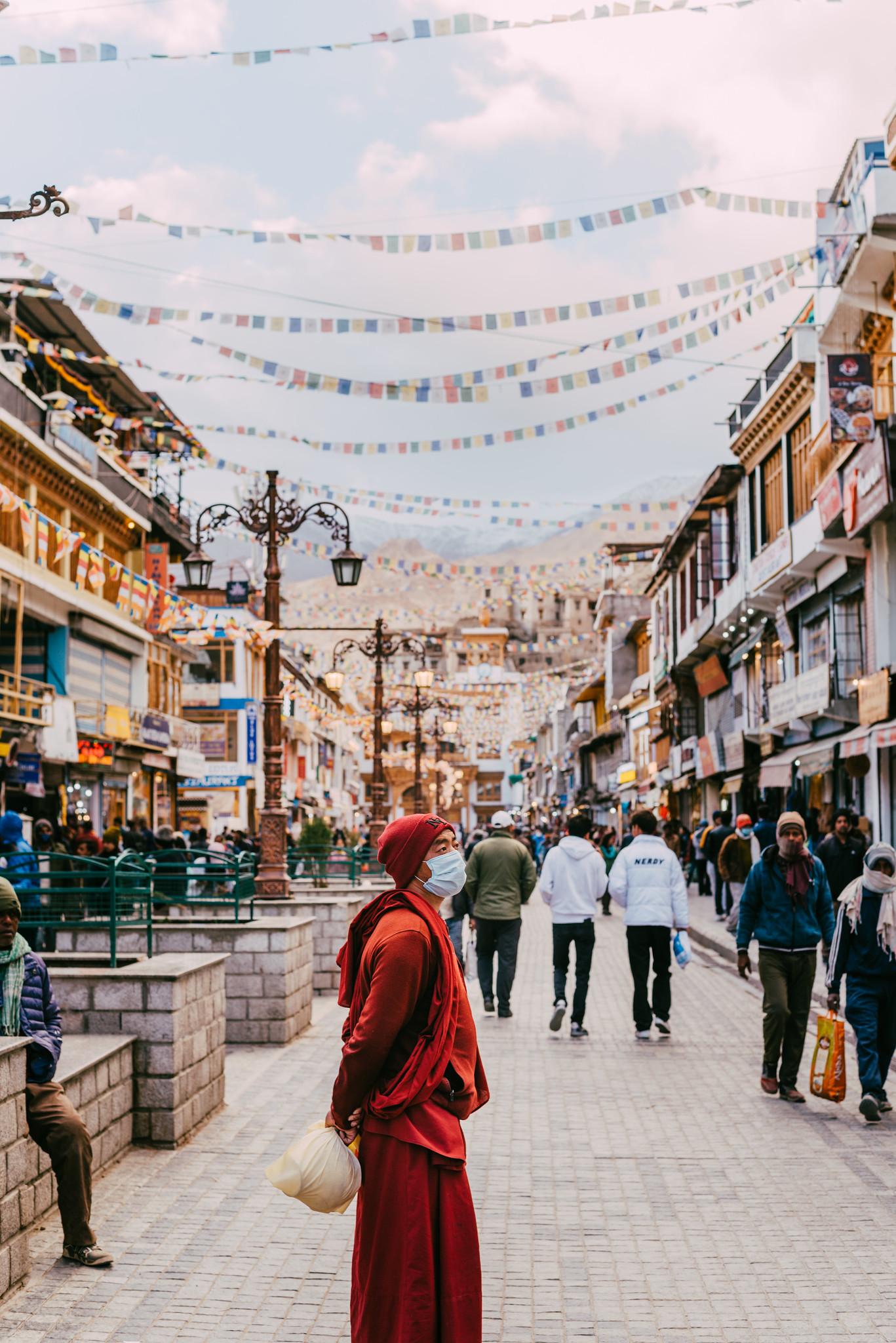
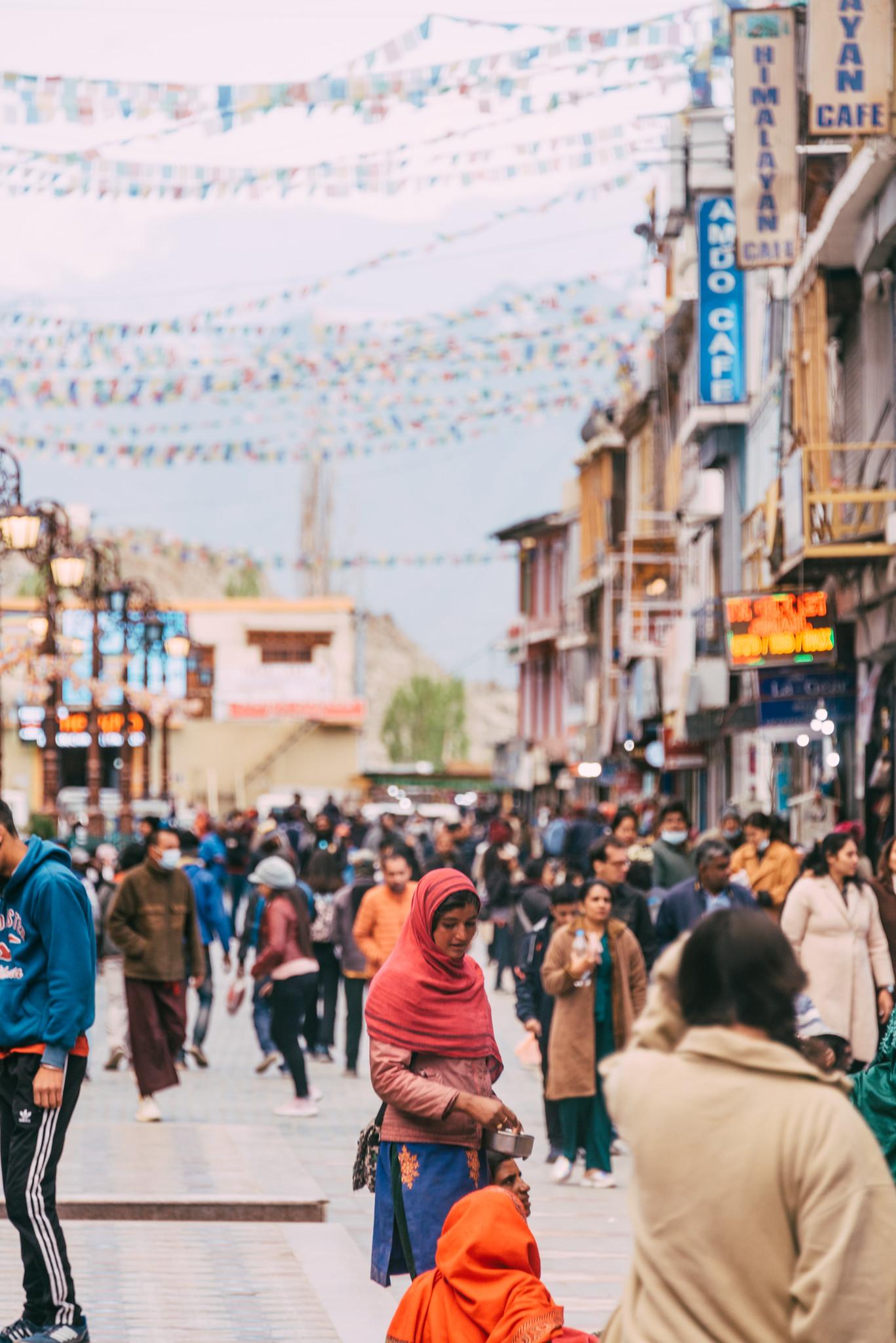
Got a couple of souvenir items for my friends, and then calmly strolling back to my hotel, down the hill.
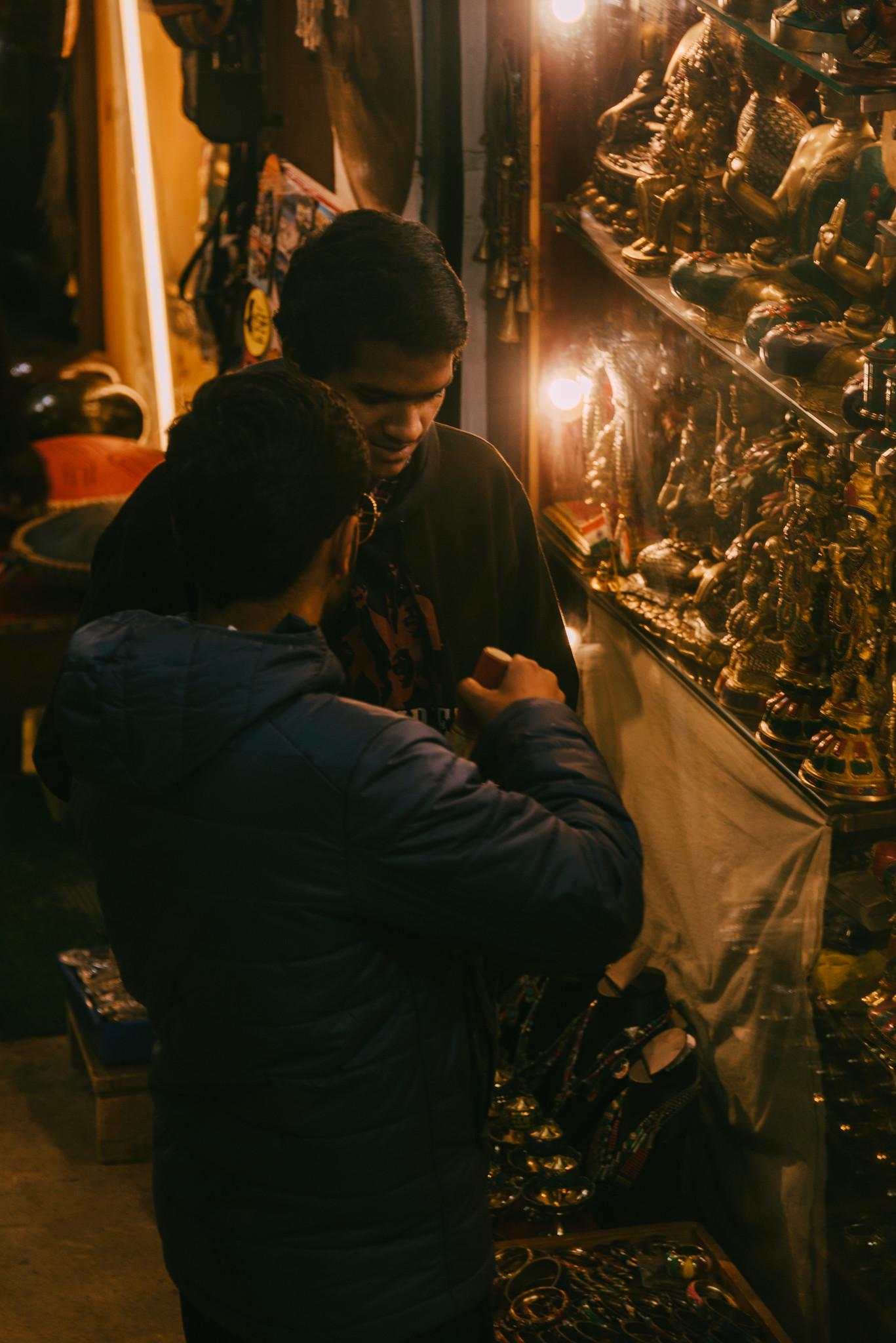
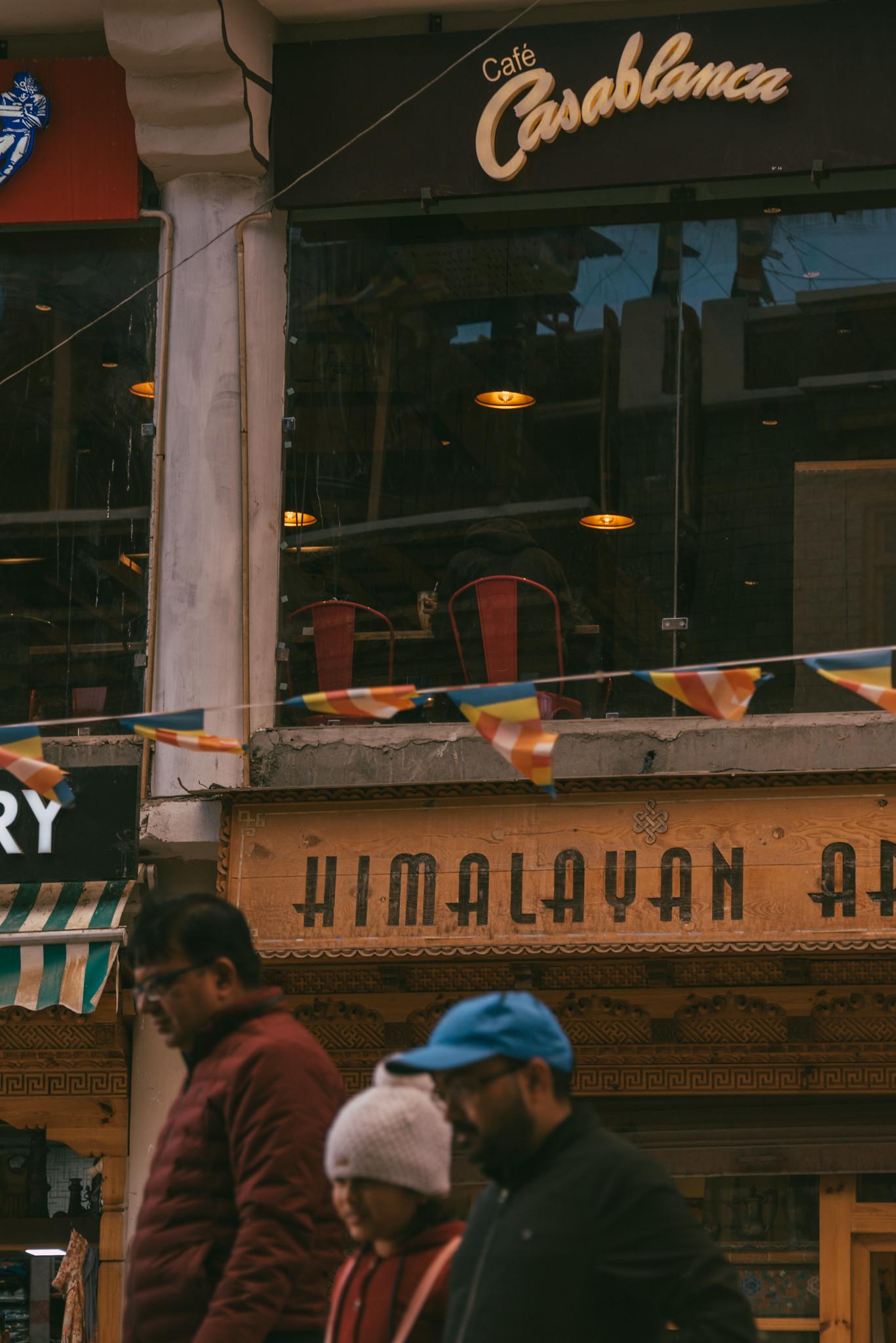
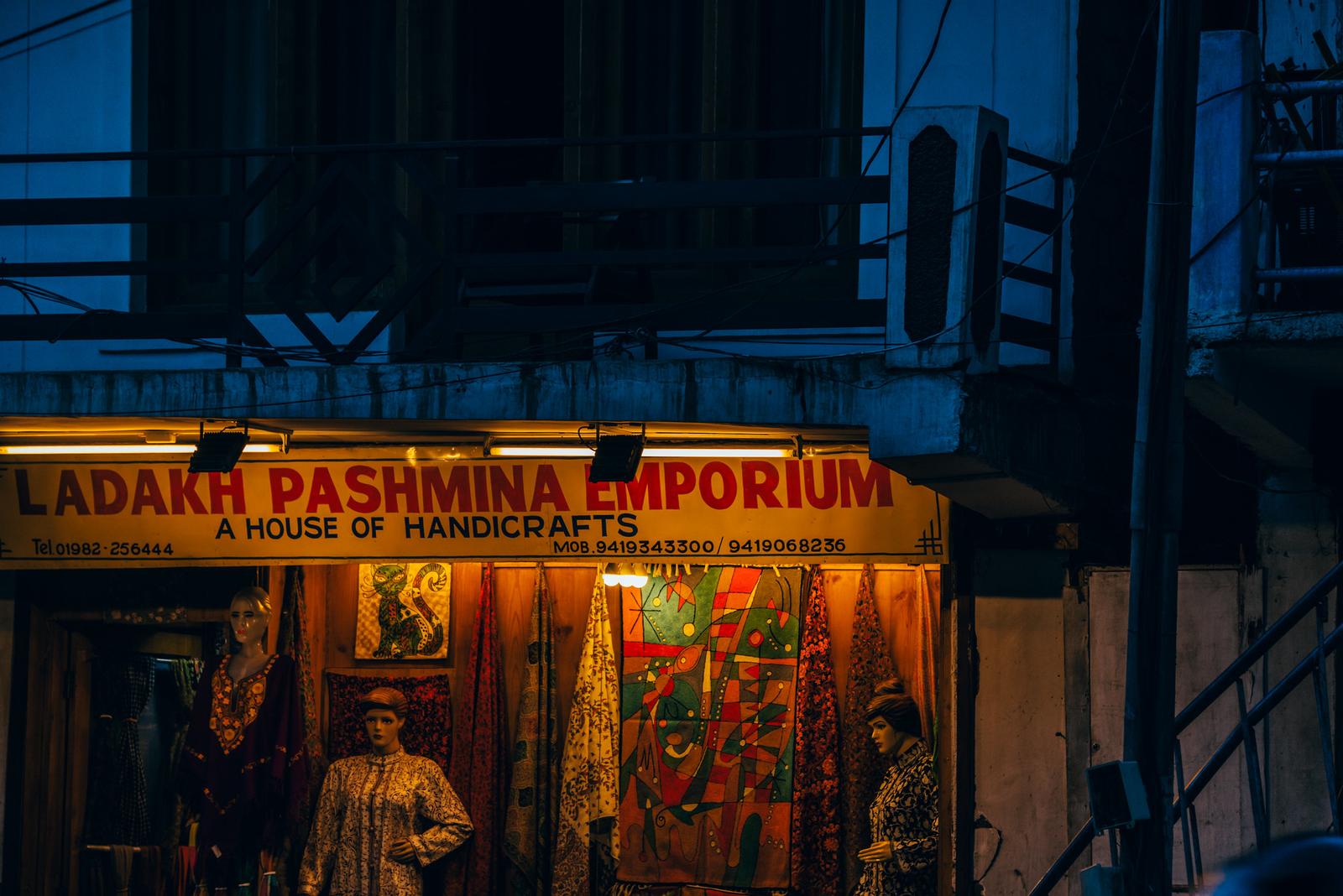
On the backdrop from afar, sunset then became a glimpse of violet light.
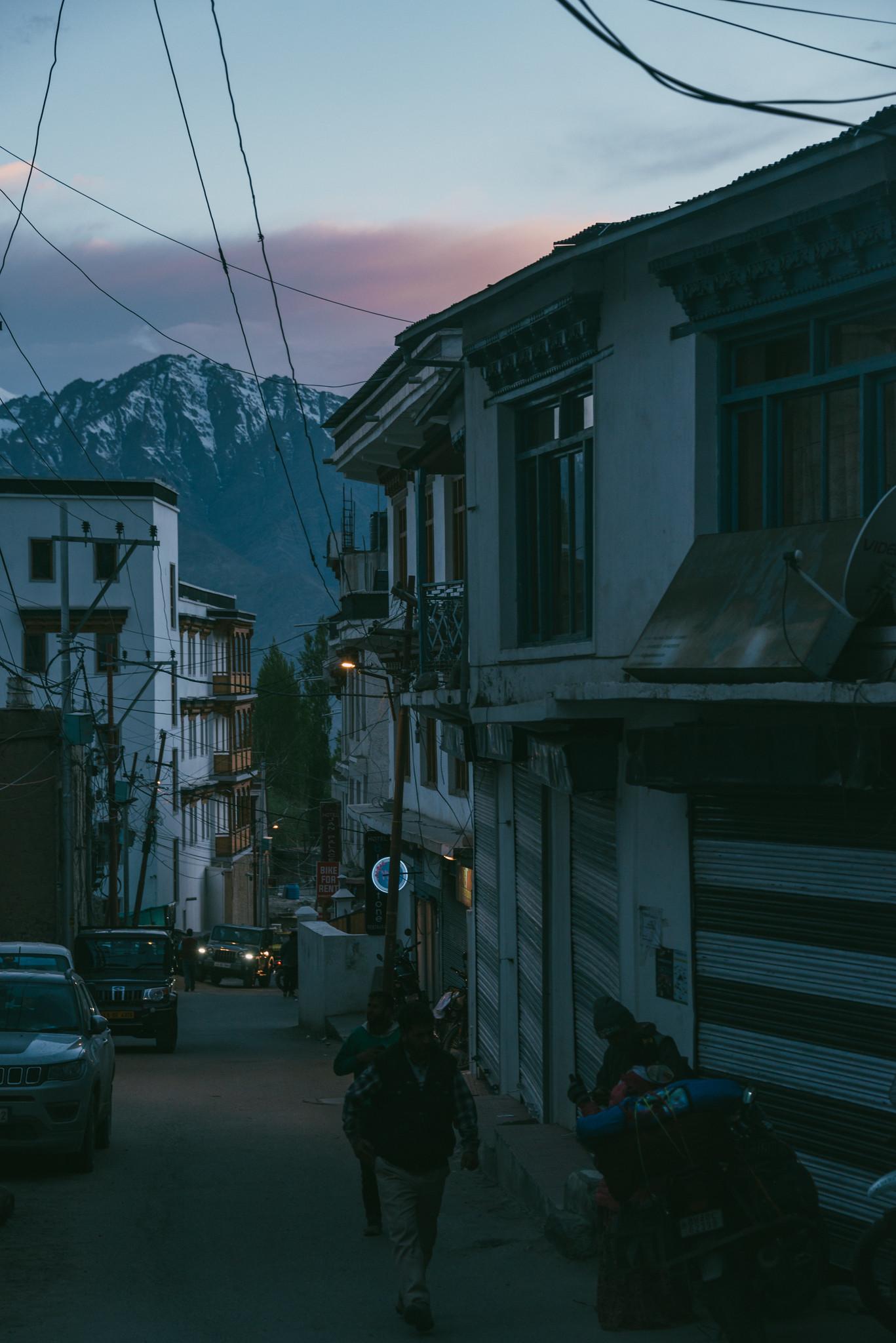
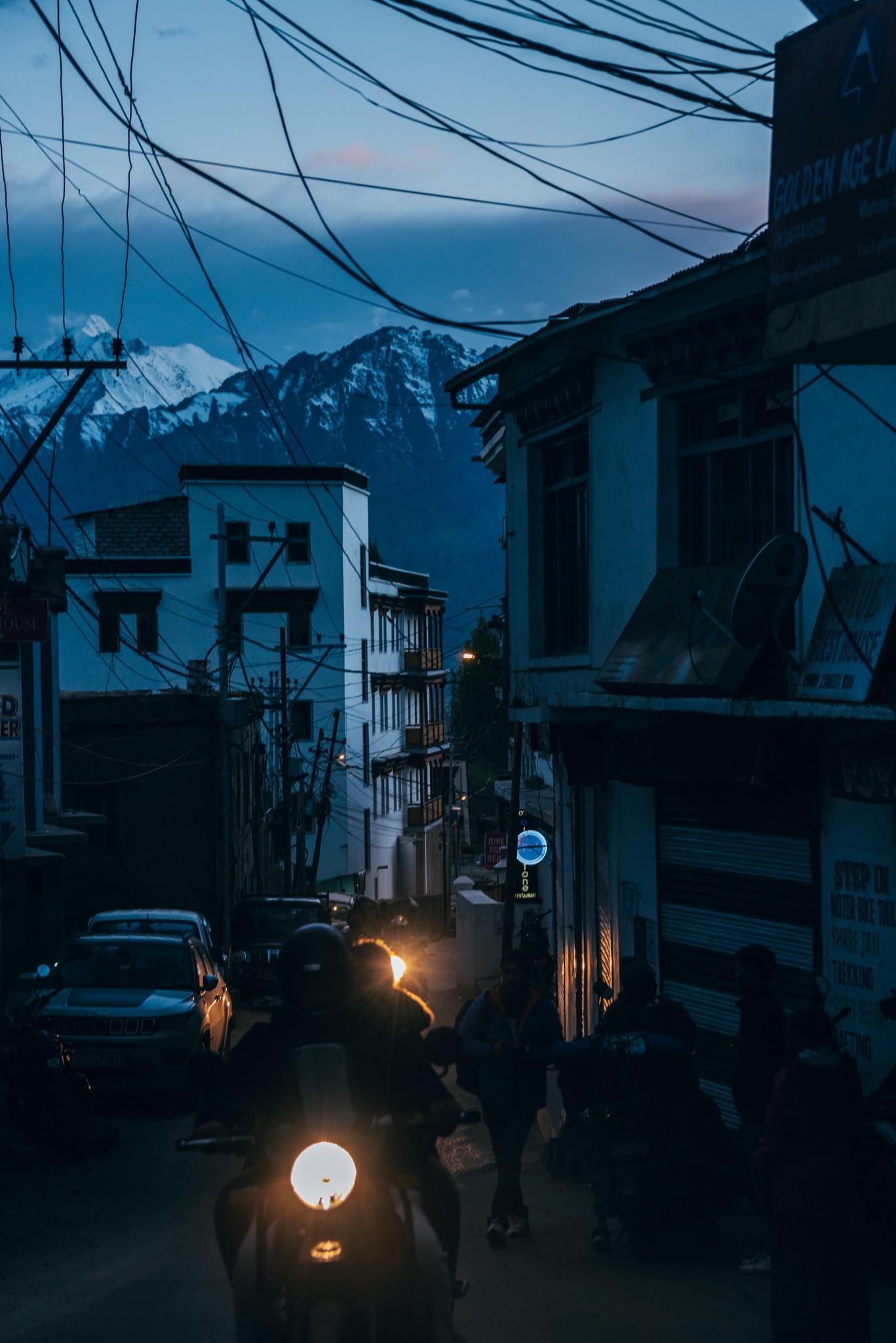
Time to have a good night, before a much more intense journey awaited me ahead.
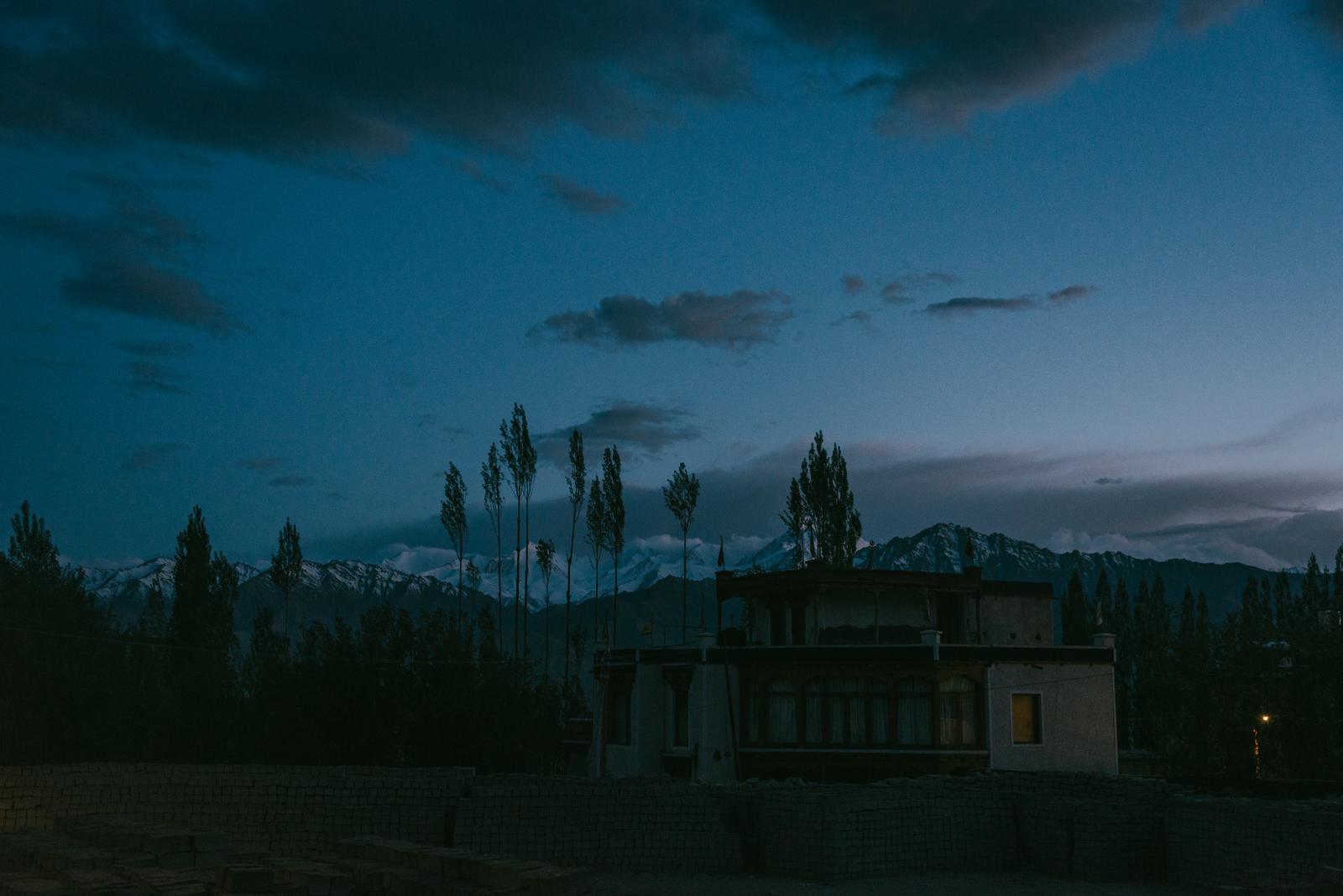
Comments
About
Zuyet Awarmatrip is a subsidiary identity within the personal ecosystem of Zuyet Awarmatik, focusing on travel and photography.
A Vietnamese usually regarding himself as a carefree solo Eastern backpacker, alongside with his main profession as a UX engineer. Neither being a freelancer nor a digital nomad, this website is built for the purpose of recording his life experience and happenings instead of letting them go into oblivion. He hopes these photos here shall always deliver the colorfulness of this worldly reality.
Whenever feeling lonely, I travel alone. And that feeling is good.

